Medical Costs Are Consuming Americans’ Financial Health
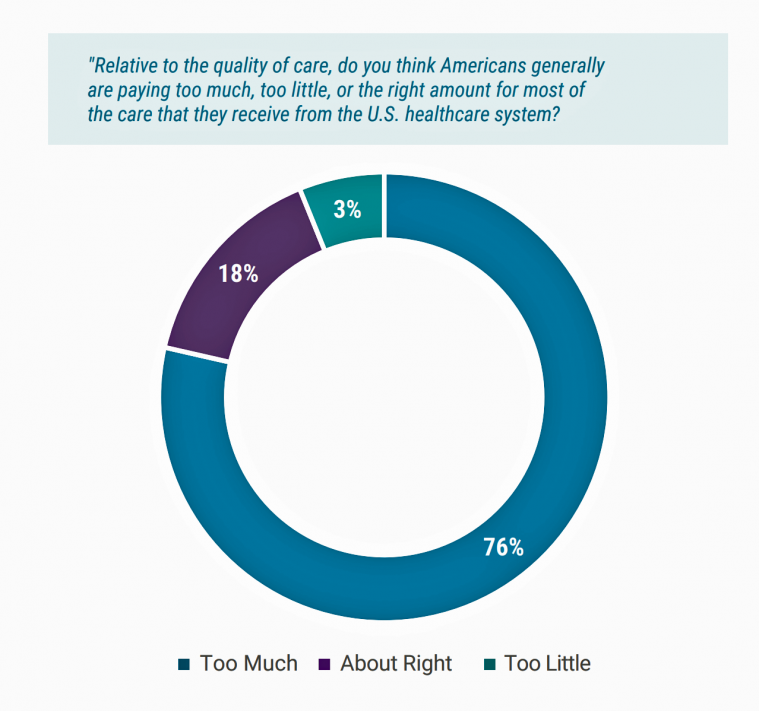
Spending on medical care costs crowded out other household spending for millions of Americans in 2018, based on The U.S. Healthcare Cost Crisis, a survey from West Health and Gallup. Gallup polled 3,537 U.S. adults 18 and over in January and February 2019. One in three Americans overall are concerned they won’t be able to pay for health care services or prescription drugs: that includes 35% of people who are insured, and 63% of those who do not have insurance. Americans borrowed $88 billion in 2018 to pay for health care spending, West Health and Gallup estimated. 27 million Americans
Our Mobile Health Data: Shared, Identifiable, and Privacy-Deprived
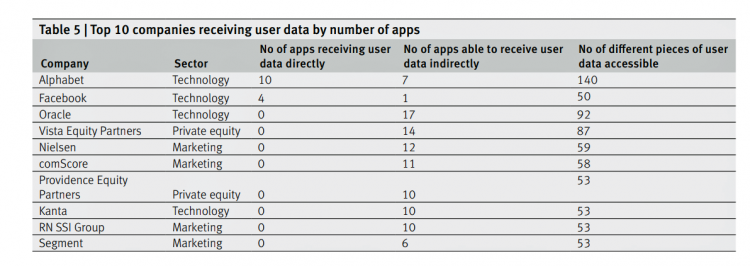
As more mobile app users — consumers, patients, and caregivers — use these handy digital health tools, much of the data we share can be re-identified and monetized by third parties well beyond those we believe we’re sharing with. This compromised health data privacy scenario comes out of research published this month in the BMJ, Data sharing practices of medicines related apps and the mobile ecosystem: traffic, content, and network analysis. The researchers, faculty from the University of Toronto (Canada) and the University of Sydney (Australia), come from nursing, pharmacy, and computer science expertise — a sound combination of disciplines
Isn’t It Eyeconic? Vision Care in the Evolving Health Care Ecosystem
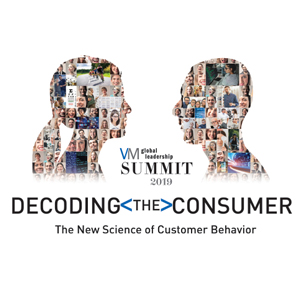
The vision/optical industry is one piece of the health/care ecosystem, but the segment has not been as directly impacted by patients’ new consumer muscles until just about now. It feels like the vision industry is at an inflection point at this moment, I intuited during yesterday’s convening of Decoding the Consumer: The new science of customer behavior, the theme of the 13th annual global leadership summit hosted by Vision Monday, a program of Jobson Medical Information which is part of the WebMD family. I was grateful to have an opportunity to share my views with attendees on the vision patient as
The Evolution of Self-Care for Consumers – Learning and Sharing at CHPA
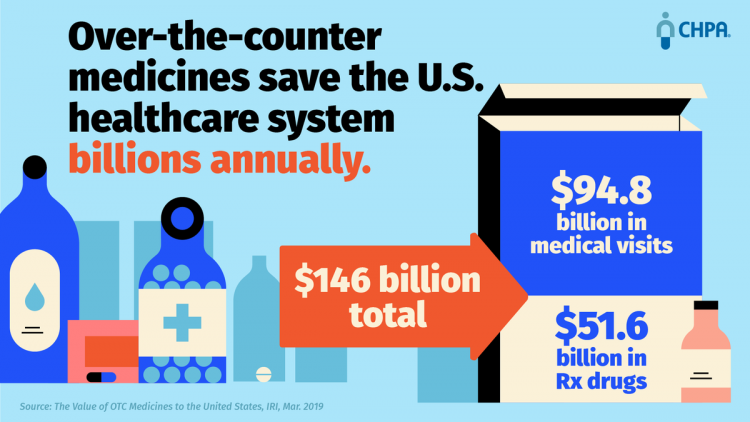
Self-care in health goes back thousands of years. Reading from Hippocrates’ Corpus about food and clean air’s role in health sounds contemporary today. And even in our most cynical moments, we can all hearken back to our grandmothers’ kitchen table wisdom for dealing with skin issues, the flu, and broken hearts. The annual conference of the Consumer Healthcare Products Association (CHPA) convened this week, and I was grateful to attend and speak on the evolving retail health landscape yesterday. Gary Downing, CEO of Clarion Brands and Chairman of the CHPA Board, kicked off the first day with a nostalgic look
The Balance of Personalization and Privacy For Health/Care – Amazon and Beyond
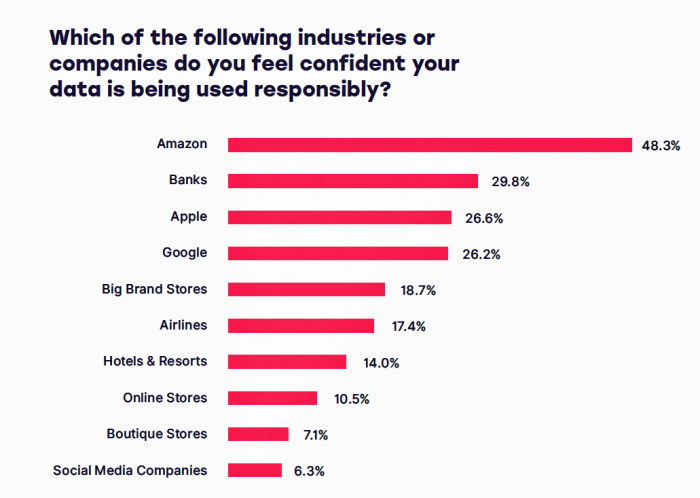
“Is it possible to take personalization too far for consumers?” asks a paper on Privacy and Personalization from SmarterHQ. The answer is, “it depends.” Consumers are sending mixed messages to marketers about their preferences for being forgotten versus being engaged and recognized. This tension has extreme relevance for personal health and healthcare, as AI and data analytics become quickly adopted by payors, insurance companies, providers, pharma, and consumer tech companies that lie outside of HIPAA privacy and security regulations. SmarterHQ polled over 1,000 consumers and found that: Most consumers are concerned about their data privacy, and believe that companies know too
Digital Transformation Is The New Mantra But Can’t Happen Without Access To Connectivity
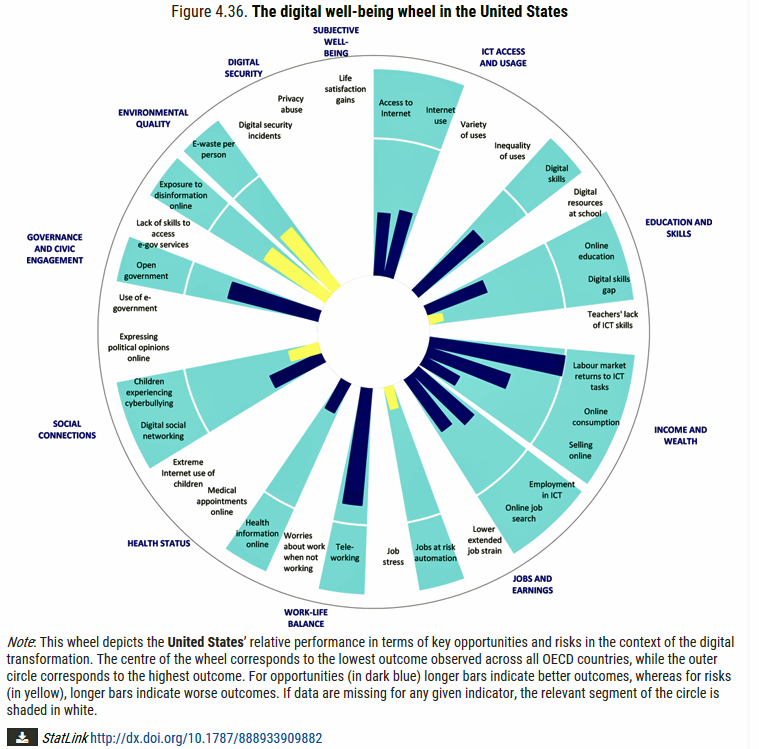
As more of our “things” get digitally connected, there’s an unanswered question about how our connected lives impact human life and health. A new report from the OECD asks and answers: How’s Life in the Digital Age? Opportunities and Risks of the Digital Transformation for People’s Well-being. This research is part of OECD’s ongoing series asking the Big Question, “How’s Life?” A prevailing current mantra in work and daily living is “digital transformation.” The OECD broadly defined the phrase in their 2017 paper on the topic as follows: Mobility, cloud computing, the Internet of things (IoT), artificial intelligence (AI) and big
Trust in 2019 Via Edelman: The Plotline for Women and Healthcare
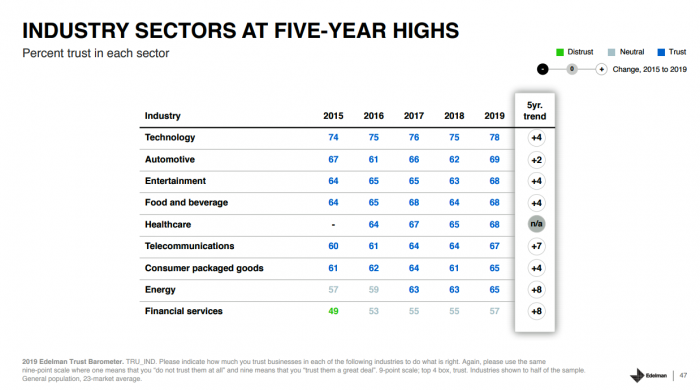
Fewer than one-half of consumers trust in government and media. Three-quarters trust employers, who in 2019 are the top-trusted institution according to the 2019 Edelman Trust Barometer released last week in Davos at the World Economic Forum. Consumers in the U.S. over-index for trust in employers, with 80% of people saying they have a strong relationship with “my employer,” compared with 73% of Britons, 66% of the French, and 59% of people in Japan. What’s underneath this is employers being trusted to provide certainty: most workers look to their employer to be a trustworthy source of information about social issues and
The Consumer and the Payor, Bingo and Trust: My Day At Medecision Liberator Bootcamp

To succeed in the business of health information technology (HIT), a company has to be very clear on the problems it’s trying to address. Now that EHRs are well-adopted in physicians’ practices and hospitals, patient data have gone digital, and can be aggregated and mined for better diagnosis, treatment, and intelligent decision making. There’s surely lots of data to mine. And there are also lots of opportunities to design tools that aren’t very useful for the core problems we need to solve, for the clinicians on the front-lines trying to solve them, and for the patients and people whom we
Shelly Palmer De-Hypes CES 2019 & Has Lessons for Health/Care
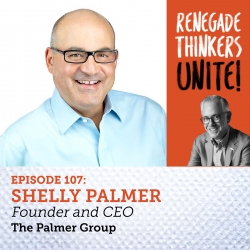
I had the pleasure once again of attending Shelly Palmer’s annual kick-off breakfast where he level-sets our expectations for CES two hours before the tech halls open. Shelly is a consumer tech expert and leads the Palmer Group; comments on Fox 5 in NYC, CNN, and CNBC; writes a weekly column in Advertising Age; composes music; and he’s a Renaissance Man who’s a generous sharer of knowledge with a great sense of humor and humanity. Shelly is one of my trusted touchpoints for all-things-consumer-tech. His message at the start of #CES2019: this year, the show is about connectivity and partnership.
Heart Health at #CES2019 – Food and Tech as Medicine
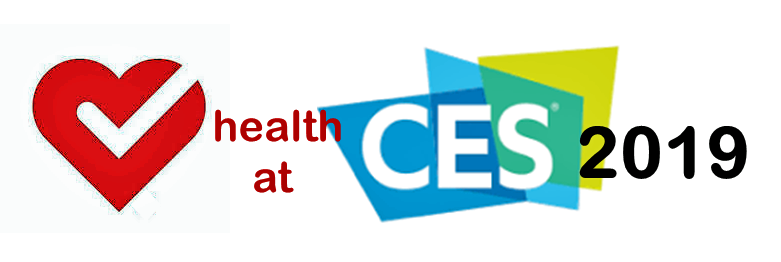
Self-care is the new health care as patients, now consumers at greater financial risk for medical spending, are learning. At #CES2019, I’m on the lookout for digital technologies that can help people adopt and sustain healthy behaviors that can help consumers save money on medical care and enhance quality of life-years. This week’s heart-and-food tech announcements at #CES2019 coincide with an FDA recall on a popular drug prescribed to treat hypertension (high blood pressure). Using food and tech as medicine can help people avoid going on medications like statins and others for heart health. An important example of this self-care
Nurses are the most trusted profession in America, followed by doctors and pharmacists

Nurses rank top in Americans’ minds for the seventeenth year-in-a-row, Gallup found in its annual survey of honesty and ethics in professions. At the bottom of the list for honesty and ethics in 2018, Gallup points to U.S. Congressional representatives, “Mad Men” and Women of advertising, telemarketers, and folks who sell autos. Congress-folk and car salespeople have ranked at the low-trust bottom for many years in this Gallup poll. While the 3 health care professions rose once again to the top of the job-trust roster, nurses rank far greater than doctors and pharmacists by a 17-point margin of consumers rating the
Data Privacy and Healthcare Access: Top Issues Shaping Consumers’ Societal ROI

Organizations that address consumers’ data privacy and access to healthcare create greater social brand equity, inspiring people to say nice things about the companies, recommend them as good employers, and be welcomed as businesses operating in peoples’ community. In The Societal ROI Index: A Measure for The Times We Find Ourselves In, Finn Partners and The Harris Poll measure U.S. companies’ reputations for social good, the project’s press release explains. “Our new data shows that the public has a definite opinion about what issues they feel companies should address and the social impact bar has been set high,” according to Amy Terpeluk,
The Smartphone Is the Consumer’s Personal Health Platform – Implications from Deloitte’s 2018 Survey

American consumers are now viewing their phones an average of 52 times daily, with 39 percent of consumers believing they use their smartphones too much. In fact, 60 percent of 18 to 34-year-olds admit to smartphone overuse, the highest level of any age group. However, 63 percent of the respondents reported trying to limit their smartphone usage, roughly half succeeding in cutting back. Smartphones also are helping blur the lines between work and leisure with 70 percent of respondents using personal smartphones at least occasionally for after-hours work. Furthermore, voice technologies are “making noise,” according to Deloitte in A New Era
Physicians Don’t Talk Enough with Patients About Non-Medical Needs

Most patients wish their doctors would have a conversation with them about non-medical issues. The Doctor-Patient Conversation, a survey conducted for the Samueli Foundation by the Harris Poll, examined how patients feel about their health, healthcare, and relationships with physicians. The Samueli Institute, has several missions including integrative health with a focuses on evidence-based practices for healing, wellbeing and resilience. Patients are keen to learn about non-medication alternatives, like food-as-medicine, meditation, and acupuncture. But most doctors base their conversations with patients on purely medical options like lab test results and surgical procedures. The top issues doctors discuss with patients are
Consumers Want Help With Health: Can Healthcare Providers Supply That Demand?

Among people who have health insurance, managing the costs of their medical care doesn’t rank as a top frustration. Instead, attending to health and wellbeing, staying true to an exercise regime, maintaining good nutrition, and managing stress top U.S. consumers’ frustrations — above managing the costs of care not covered by insurance. And maintaining good mental health and staying on-track with health goals come close to managing uncovered costs, Oliver Wyman’s 2018 consumer survey learned. These and other important health consumer insights are revealed in the firm’s latest report, Waiting for Consumers – The Oliver Wyman 2018 Consumer Survey of US
Loneliness, Public Policy and AI – Lessons From the UK For the US
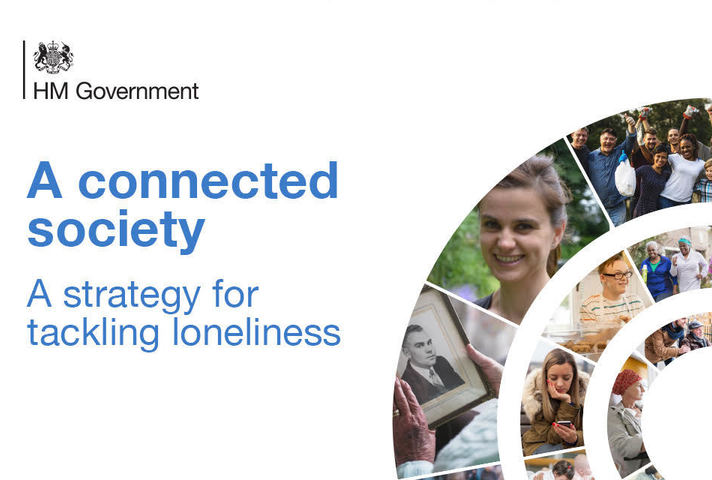
There’s a shortage of medical providers in the United Kingdom, a nation where healthcare is guaranteed to all Britons via the most beloved institution in the nation: The National Health Service. The NHS celebrated its 70th anniversary in July this year. The NHS “supply shortage” is a result of financial cuts to both social care and public health. These have negatively impacted older people and care for people at home in Great Britain. This article in the BMJ published earlier this year called for increasing these investments to ensure further erosion of population and public health outcomes, and to prevent
The Single Market for Healthcare in Europe: Learnings for the U.S.

When I asked my longtime colleague and friend Robert Mittman, with whom I collaborated at Institute for the Future for a decade, how he managed international travel and jet lag, he said simply, “The time zone you’re in is the time zone you’re in.” This lesson has stayed with me since I received Robert’s advice over twenty years ago. Over the next two weeks, as I work alongside colleagues and clients in the EU and soon-to-Brexit UK, I am in time zones five and six hours later than my home-base of US Eastern Time. But the time zones I’m working
Open Source Health Care Will Liberate Patients
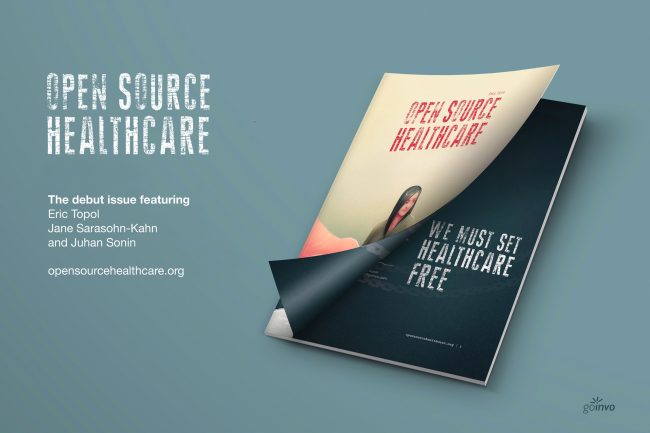
Information is power in the hands of people. When it’s open in the sunshine, it empowers people — whether doctors, patients, researchers, Presidents, teachers, students, Everyday People. Welcome to the era of Open Source Healthcare, not only the “about time” for patients to own their health, but for the launch of a new publication that will support and continue to evolve the concept. It’s really a movement that’s already in process. Let’s go back to some definitions and healthcare basics to understand just why Open Source Healthcare is already a thing. When information access is uneven, it’s considered
Sicker Consumers Are More Willing to Share Health Data

People dealing with chronic conditions are keener to share personally-generated data than people that don’t have a chronic disease, Deloitte’s 2018 Survey of U.S> Health Care Consumers learned. This and other insights about the patient journey are published in Inside the patient journey, a report from Deloitte that assesses three key touch points for consumer health engagement. These three patient journey milestones are searching for care, using new channels of care, and tracking and sharing health data, Deloitte maps. What drives people to engage on their patient journeys has a lot more to do with practical matters of care like convenience,
Prescription Drugs: From Costs and Bad Reputation to Civica Rx and Amazon to the Rescue

The prices of medicines prescribed in outpatient settings rose, on average, 10.3% in 2018. Wages increased about 2.6%, and consumer prices, 1.3%, based on the 2019 Segal Health Plan Cost Trend Survey. Segal forecasts that medical cost trends will moderate for 2019, lower than 2018 rates. But to the patient, now feeling like a consumer dealing with high-deductibles and the growing sticker shock of specialty drug prices, a so-called “moderate” trend still feels like a big bite in the household budget. Specifically, specialty drug trend is expected to be 14.3% in 2019, compared with 17.7% in 2018 — still several
Self-Care is Healthcare for Everyday People

Patients are the new healthcare payors, and as such, taking on the role of health consumers. In fact, health and wellness consumers have existed since a person purchased the first toothpaste, aspirin, heating pad, and moisturizing cream at retail. Or consulted with their neighborhood herbalista, homeopathic practitioner, therapeutic masseuse, or skin aesthetician. Today, the health and wellness consumer can DIY all of these things at home through a huge array of products available in pharmacies, supermarkets, Big Box stores, cosmetic superstores, convenience and dollar stores, and other retail channels – increasingly, online (THINK, of course, of Amazon — more on
The Digital Health Consumer According to Rock Health
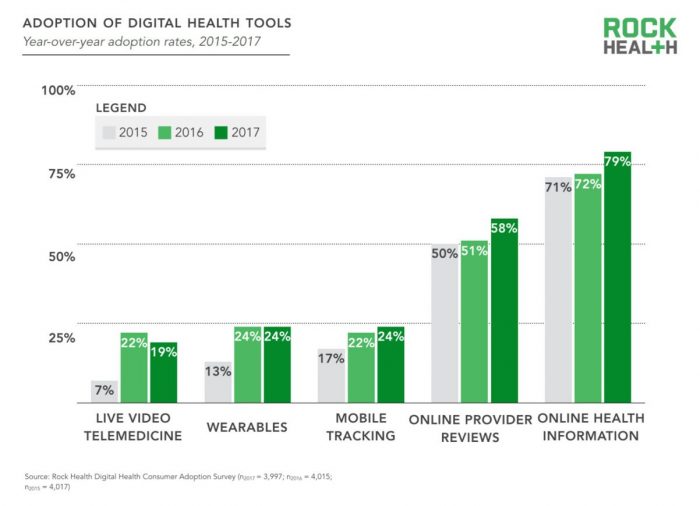
Looking for health information online is just part of being a normal, mainstream health consumer, according to the third Rock Health Digital Health Consumer Adoption Survey published this week. By 2017, 8 in 10 U.S. adults were online health information hunters. Six in 10 Americans looked for reviews of healthcare providers online, another new-normal consumer digital health activity. But only one in four people had used wearable technology for health, and one in five had participated in a live video telemedicine encounter. The Rock Health team observes that “the needle has not moved equally across every type of digital health solution.” Thus the
Best Buy Bets on AgingTech in the Expanding Retail Health Ecosystem
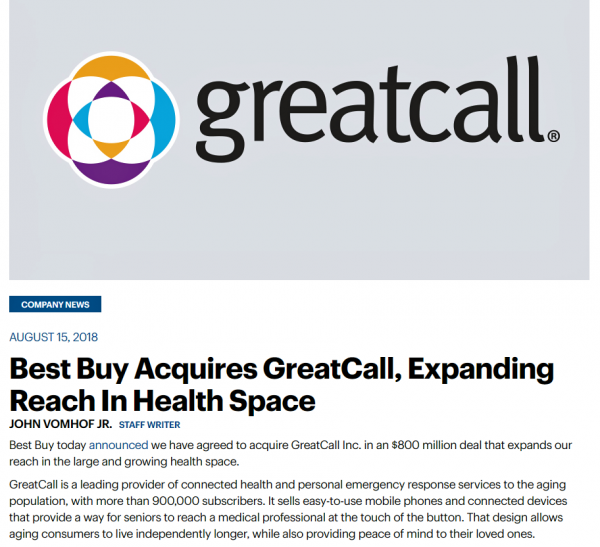
With the acquisition of GreatCall, a mature player in the aging-tech space, Best Buy is doubling down on consumer health technology@retail. This week at Best Buy. the electronics retailer, it’s out with CDs and in with technology for aging at home. The company announced that it would buy GreatCall for $800 million. A snippet from the announcement from Best Buy’s press release is shown in the first diagram, noting that GreatCall’s membership is approaching 1 million subscribers who use mobile phones and connected devices, “providing peace of mind to their loved ones.” Beyond the obvious “falling and I can’t get
How Emotions and “Nocebos” Get in the Way of Preventive Healthcare
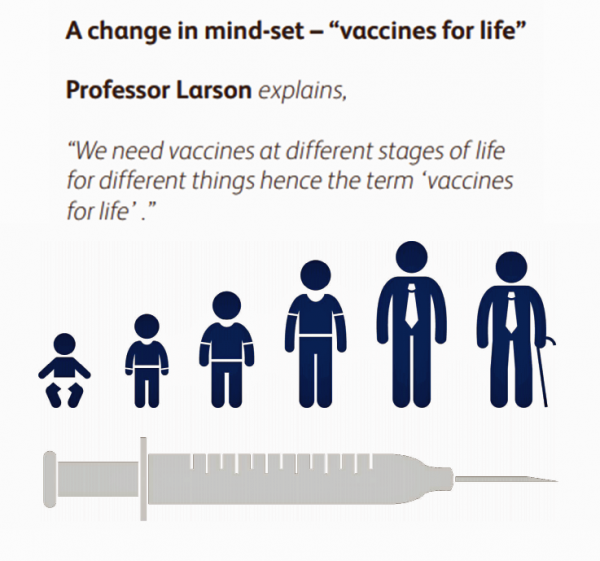
There are health facts that are based on rigorous scientific evidence. And, there are people who, for a variety of reasons, make irrational healthcare decisions without regard to those health facts. An important new report discusses the all-too-human aspects of people-as-patients, who often make health decisions based more on emotions than on the cold, hard truths that could save their lives and protect the well-being of loved ones. Preventative care and behavioural science: The emotional drivers of healthcare decisions is that report, sponsored by Pfizer Vaccines and written by the Economist Intelligence Unit (EIU). The report analyzes the psychological factors that shape consumers’ health
Most Americans Over 50 Not Buying Groceries Online….Yet
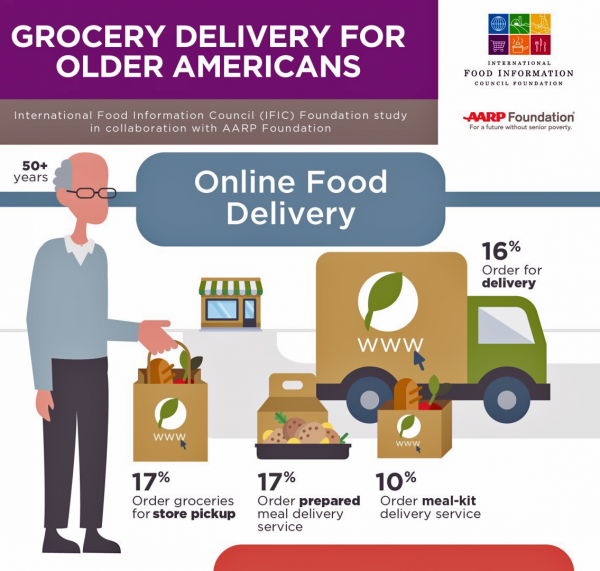
Only 17% of Americans over 50 years of age shopped for groceries online by mid-2018. But older people in the U.S. have underlying demands and needs that could nudge them to do online grocery shopping, unearthed in a survey from AARP Foundation and IFIC, the International Food Industry Council Foundation. Typically, older Americans who shop online tend to be college-educated, work full-time, and earn higher incomes. Older people with mobility issues also shop more online than folks without such challenges. But even among those older people who shop online for food, they do so less frequently than younger people do.
Closing the Digital Health Gap Between Consumers and Physicians
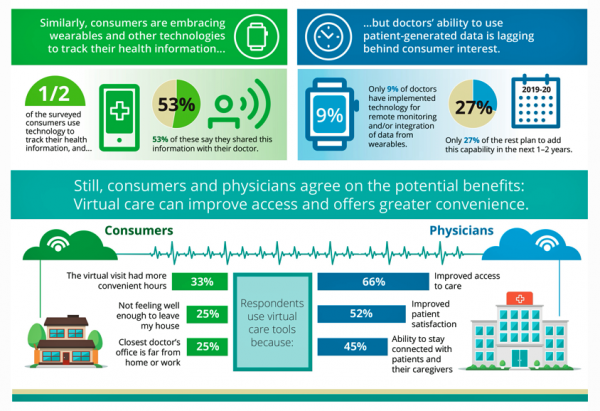
Consumers are more bullish demanding virtual and digital health tools from their physicians than doctors are in providing it, based on the research findings in What can health systems do to encourage physicians to embrace virtual care? from Deloitte. One-third of physicians have concerns about using virtual care services, such as medical errors that may result, access to technology, and data security. One in two U.S. consumers are now tracking health via digital tools, and one-half of these share the data generated by their apps. That sharing is limited by doctors’ ability to
If Data Is The New Oil in Healthcare, Will It Be Safe to Drink? The Accenture Digital Health Tech Vision 2018
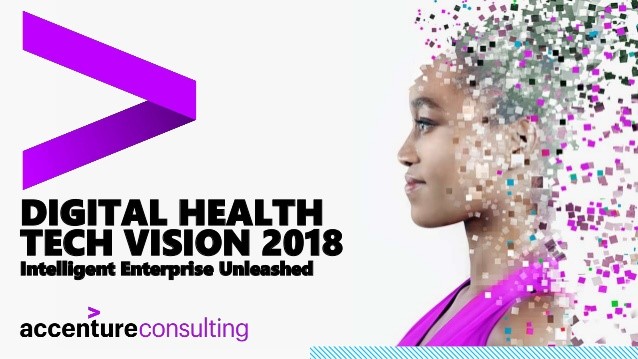
With the vast majority of patients’ medical records now digitized in electronic health records systems, the opportunities to mine, learn from, and act on the findings are promising for U.S. healthcare. More data is moving into internet clouds every day, from healthcare encounters with clinicians and inpatient hospital stays to prescribed medicines, retail receipts for over-the-counter remedies, wearable technologies, credit card swipes for products and services, and GPS check-ins. That’s a treasure trove of digital footprints that can tell a lot about us as patients, either in real-time or via prediction. But can we nudge stakeholders in health and healthcare
Consumers Consider Cost When They Think About Medical Innovation
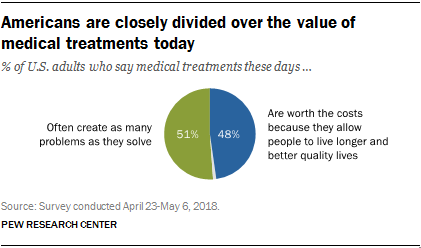
While the vast majority of Americans say that science has made life easier for most people, and especially for health care, people are split in questioning the financial cost and value of medical treatments, the Pew Research Center has found. The first chart illustrates the percent of Americans identifying various aspects of medical treatments as “big problems.” If you add in people who see these as “small problems,” 9 in 10 Americans say that all of these line items are “problems.” In the sample, two-thirds of respondents had seen a health care provider for an illness or medical condition in
Shinola Welcomes Immigrants on the 4th of July: A Love Letter from Detroit to the World Via NYC

Lady Liberty beckons to welcome the tired, the weary, and the ambitious to America in this Shinola video, made in my hometown Detroit. May this bring you joy and positive vibes on Independence Day 2018.
Healthcare Policies We Can Agree On: Pre-Existing Conditions, Drug Prices, and PillPack – the June 2018 KFF Health Tracking Poll
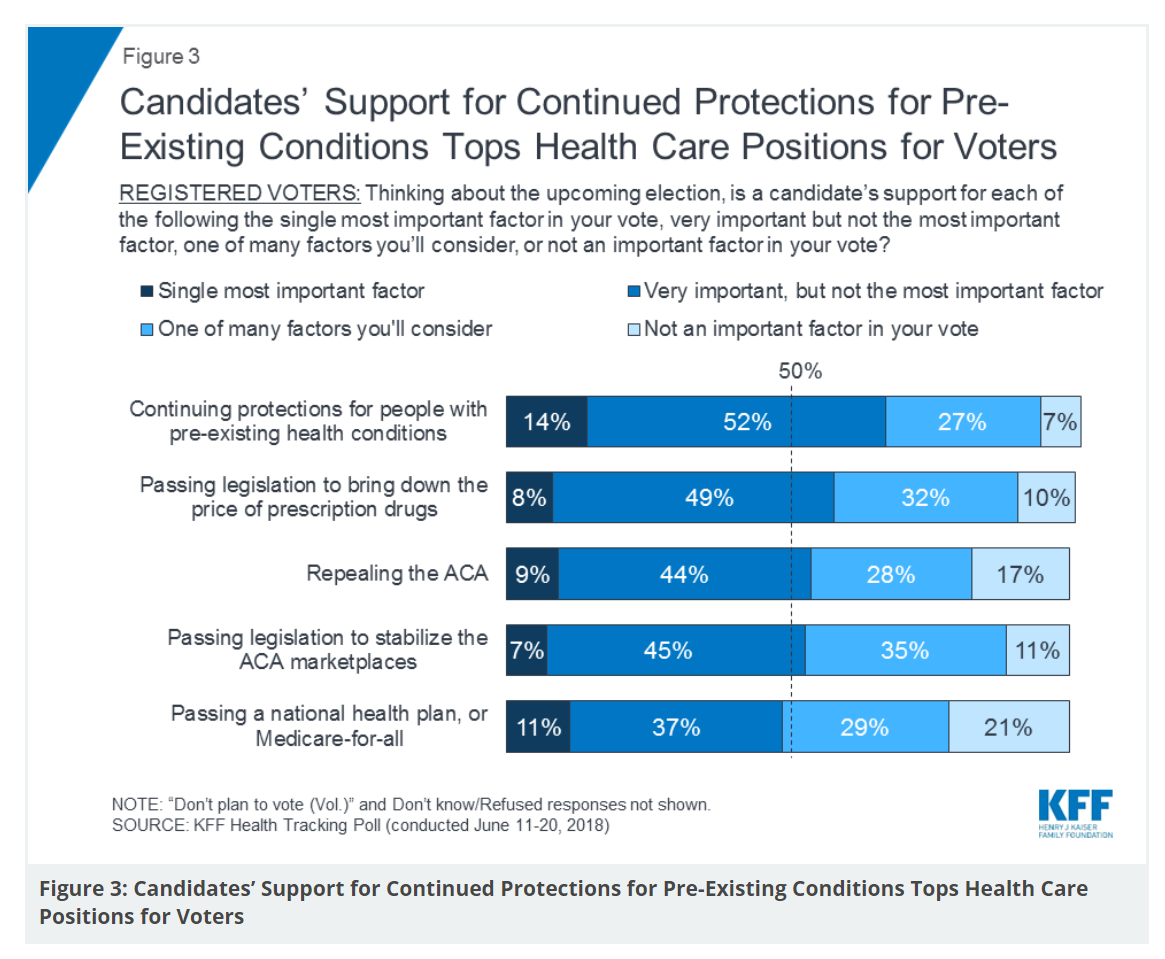
There are countless chasms in the U.S. this moment in social, political, and economic perspectives. but one issue is on the mind of most American voters where there is evidence of some agreements: health care, as evidenced in the June 2018 Health Tracking Poll from Kaiser Family Foundation. Top-line, health care is one of the most important issues that voters want addressed in the 2018 mid-term elections, tied with the economy. Immigration, gun policy, and foreign policy follow. While health care is most important to voters registered as Democrats, Republicans rank it very important. Among various specific health care factors, protecting
Patients have ambitious health goals, and look to doctors for help

Consumers have health goals across many dimensions, topped with eating well, getting fit, reducing stress, sleeping better, feeling mentally well, and improving personal finances. That’s an ambitious health-and-wellness list, identified in the Health Ambitions Study, the first such research Aetna has published. Six in ten people are looking to food and nutrition for health, whether as “medicine” to deal with chronic conditions, for weight loss or general wellness, which is a frequent theme here on Health Populi. Consumers embrace their food habits as a key self-care determinant of health. Fitness, cited by most consumers, is also a can-do, self-powered activity
Personalized Medicine: Consumer Concerns About Coverage, Affordability and Privacy
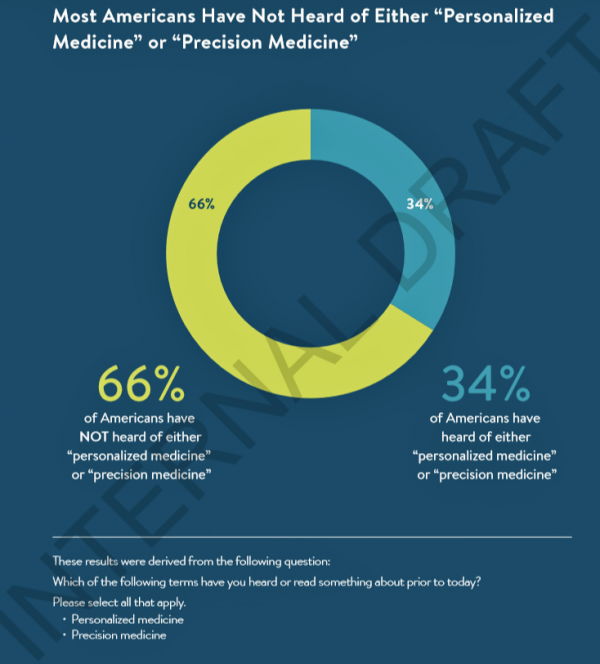
Two in 3 Americans haven’t heard the phrases “personalized medicine” or “precision medicine.” When the concept of therapies tailored to individual patients is explained, most people like the idea of diagnostic tools that can identify biological markers and marry to personal medical records data to help determine medical treatments that best fit them. This picture of U.S. consumers’ views on personalized medicine comes from a survey conducted for PMC, the Personalized Medicine Coalition, and GenomeWeb, published in May 2018. The poll results are published in Public Perspectives on Personalized Medicine, with the top-line finding that life science industry innovators must
Re-Tweeting Sanofi’s Tweet: Inclusion Matters for Health, Wellness, and the Body Politic

The communications team at Sanofi, the France-based global pharmaceutical company, quickly responded to a tweet by Roseanne Barr issued this morning about how her use of Ambien was related to her offensive tweet lobbed yesterday on Twitter about Valerie Jarrett, President Obama’s senior advisor. Barr’s comment on Twitter late last night was that, “I was ambien tweeting.” Ambien is Sanofi’s prescription drug used by patients to deal with insomnia and sleeplessness. Data provided to the FDA from patients who have used the product demonstrate a variety of side effects including but not limited to nausea, headache, slowed breathing, and amnesia
How to Make Healthcare More Intelligent and Trustworthy: Accenture’s Digital Health Tech Vision 2018

“Do no harm” has been the professional and ethical mantra of physicians since the Hippocratic Oath was first uttered by medical students. The origins of that three-word objective probably came out of Hippocrates’ Corpus, which included a few additional words: “to do good or to do no harm.” The proliferation and evolution of digital technologies in health care have the potential to do good or harm, depending on their application. Doing good and abstaining from doing harm can engender trust between patients, providers, and other stakeholders in health. Trust has become a key currency in provider/patient/supplier relationships: 94% of health executives
Consumers Shop Food for Health, But Cost Is a Barrier to Healthy Eating
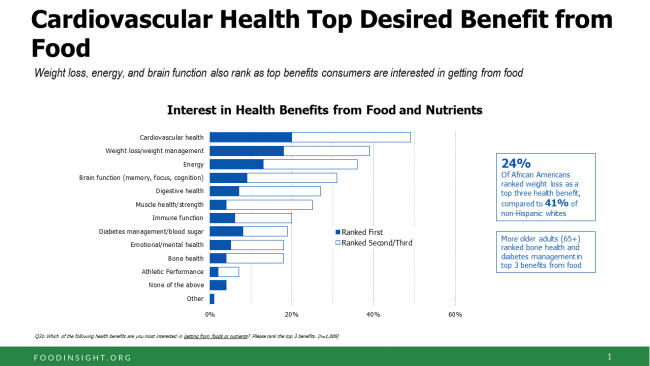
One-third of Americans are following a specific eating pattern, including intermittent fasting, paleo gluten-free, low-carb, Mediterranean diet, and Whole 30, among dozens of other food-styles in vogue in 2018. It’s mainstream now that Americans are shopping food for health, with eyes focused on heart health, weight, energy, diabetes, and brain health, according to the 2018 Food & Health Survey from IFIC, the International Food Industry Council Foundation. But underneath these healthy eating intentions are concerns about the cost of nutritious foods, IFIC reports. And this aspect of home health economics can sub-optimize peoples’ health. Consider the first graph on consumers’
Healthcare Information In-Security Is the New Normal

Three-fourths of healthcare providers experienced a data breach in 2017, according to the HIMSS 2018 Cybersecurity Survey. Health data insecurity is the new normal. A big piece of addressing the cybersecurity healthcare challenge is educating people who work in healthcare settings, and that has been under-funded. Only 41% of healthcare workers say they receive security training, a Forrester study learned in January 2018. Forrester also found that while healthcare organizations have experienced some of the most egregious cyberattacks, the industry allocates a smaller proportion of IT budgets to security compared with than other organizational types at a rate of 22%
Americans’ Trust in the Healthcare System Low Compared to Rest-of-World’s Health Citizens
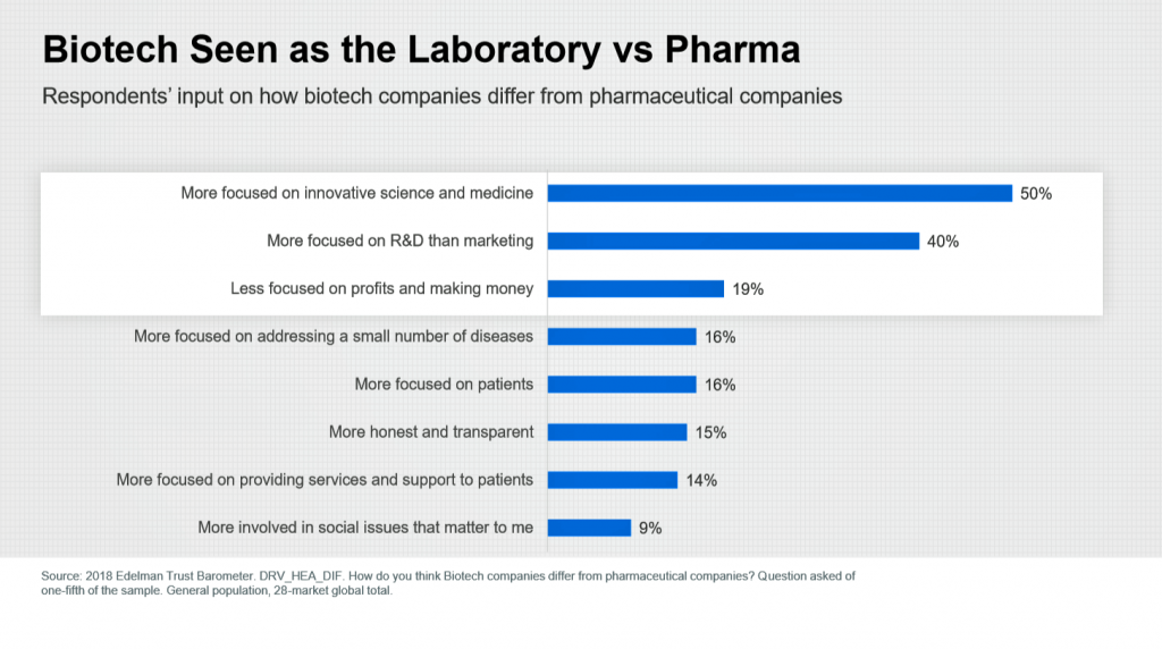
In the U.S., trust in the healthcare industry declined by 9 percentage points in just one year, declining from 62% of people trusting — that’s roughly two-thirds of Americans — down to 53% — closer to one-half of the population. I covered the launch of the 2018 Edelman Trust Barometer across all industries here in Health Populi in January 2018, when this year’s annual report was presented at the World Economic Forum in Davos as it is each year. The Edelman team shared this detailed data on the healthcare sector with me this week, for which I am grateful. Check
Healthcare Companies’ Reputations Go North While All Other Industries’ Reps Fall; and, A Lesson from Campbell’s Soup
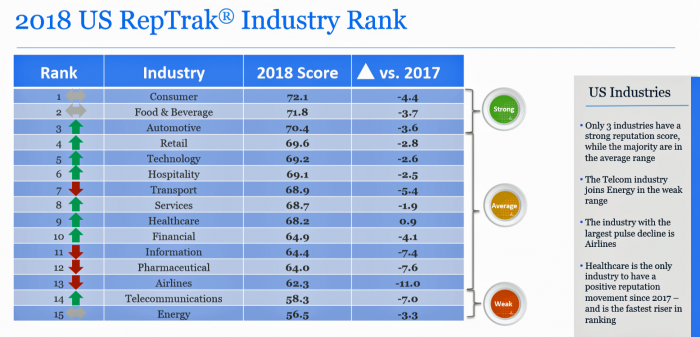
Healthcare has a reputation halo in the eyes of U.S. consumers, who ranked the sector as the only industry whose reputations rose between 2017 and 2018. But consumers separate the pharma industry from healthcare: prescription drug manufacturers’ reputation took the second-largest fall, just behind the airline industry. Pharma and airlines were the lowest-ranked industries, along with telecomms and energy. The Reputation Institute has published its annual 2018 US RepTrak Industry Rankings, finding that all industries but healthcare took negative hits on reputation from 2017 to 2018. The study asks consumers to rate the most reputable companies in their daily lives.
Consumer Trust, Privacy and Healthcare – Considering #HIMSS18 in the Stark Light of Facebook and Cambridge Analytica
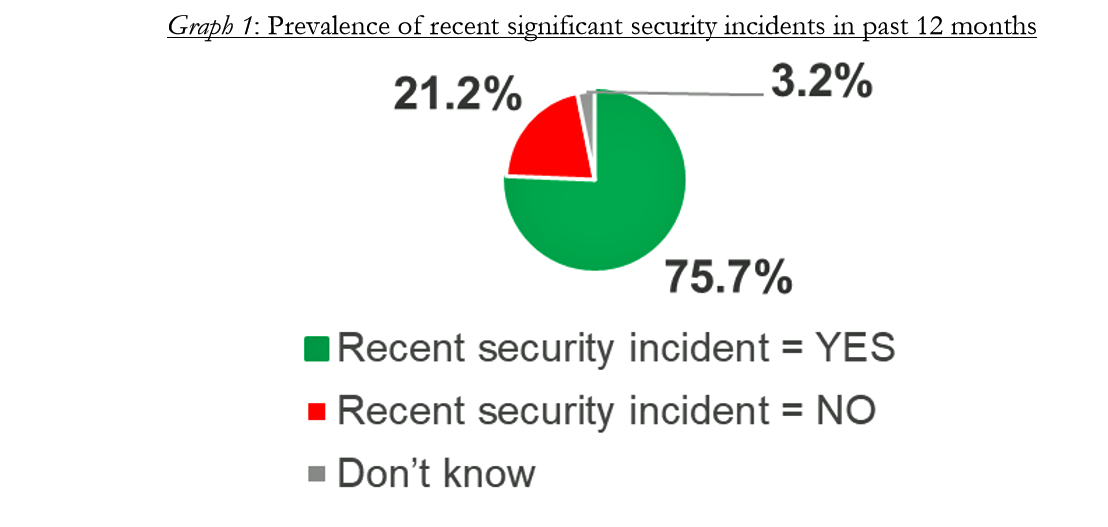
What a difference a couple of weeks make…. On 1st March 2018, two over-arching issues remained with me leaving Las Vegas and #HIMSS18: the central, recognized role of cybersecurity threats in healthcare, and the growing use of consumer-facing technologies for self- and virtual care. Eighteen days later, we all learned about Cambridge Analytica’s misuse of 50 million Americans’ social network data posted on Facebook. We who work in healthcare must pose the questions: going forward, how trusting will patients, consumers and caregivers be sharing their personal health information (PHI)? Will people connect dots between their Facebook lives – and their
How the Latest on Facebook and the “Deep State” Could Undermine Patient Data Sharing and AI
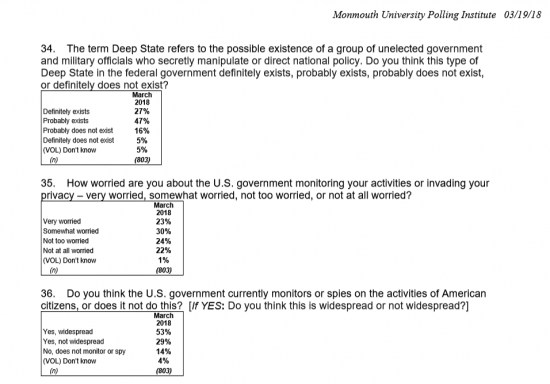
There’s a potential large obstacle that could prevent the full benefits of the current go-go, bullish forecasts for artificial intelligence (AI) to help make healthcare better: a decline in consumers’ willingness to share their personal data. Along with the overall erosion of peoples’ trust in government and other institutions comes this week’s revelations about Facebook, Cambridge Analytica, and the so-called Deep State. Three-fourths of Americans believe that some type of “Deep State” in the federal government exists, a new poll from Monmouth University published yesterday. I clipped the responses to three of the survey’s most relevant questions here. Not only
Patient Privacy And Cyber In-Security at HIMSS 2018
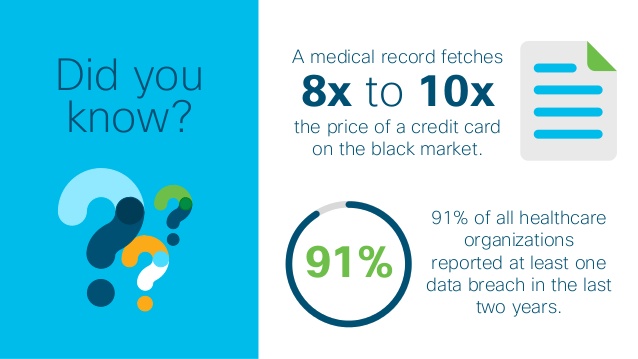
Nearly one-half of Americans experienced a personal data breach in the past three years, the third annual national cybersecurity survey found. Ensuring privacy and cybersecurity should become integrated into the healthcare industry’s consideration of a patient’s consumer experience. This makes sense, given that privacy and cybersecurity ranked the second highest priority to hospitals and healthcare providers polled in HIMSS 2018 Healthcare Leadership Survey. Providers put patient safety as #1. Appropriately, privacy and security were hot topics at HIMSS Annual Conference this year, in respond to providers’ demands for more education and concerns around the challenges. Let’s put these concerns in
Will People Enrolled in Medicaid Want to Be Amazon Prime’d?

Amazon is planning to extend Prime subscriptions to people enrolled in Medicaid for the discount price of $5.99 a month instead of the recent price increase to $12.99/month or $99 a year. The $5.99 a month calculates to a 27% break on the annual Prime membership cost. Medicaid enrollees who want to take advantage of the deal must provide Amazon with a scan or image of the card they use for their benefit (either Medicaid or EBT). These consumers can enroll annually, for a maximum of four years. Here’s what the Seattle Times, Amazon’s hometown newspaper, said about the program.
Wearable, Shareable, Virtual: The Demands of the Digital Health Consumer in 2018
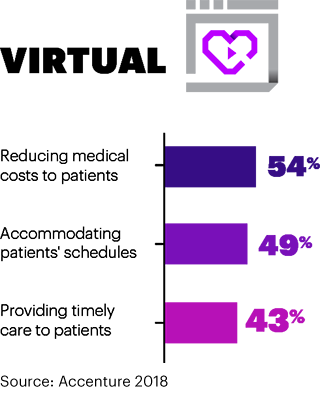
As I wrote here in April 2017, telehealth and virtual healthcare are mainstreaming. This week at the 2018 annual HIMSS conference, telehealth is playing a mainstream role in discussions about right-sizing and right-placing healthcare. The evidence for telehealth’s tipping point is rooted in new research published today by Accenture on Patients + Doctors + Machines, Accentures’ 2018 Consumer Survey on Digital Health. I sat down today with Dr. Kaveh Safavi who leads Accenture’s healthcare practice to discuss the results of this study into peoples’ atttudes toward healthcare technology and innovation. Three in four consumers in America say technology is
How One Hospital System Baked Love Into Their Health App
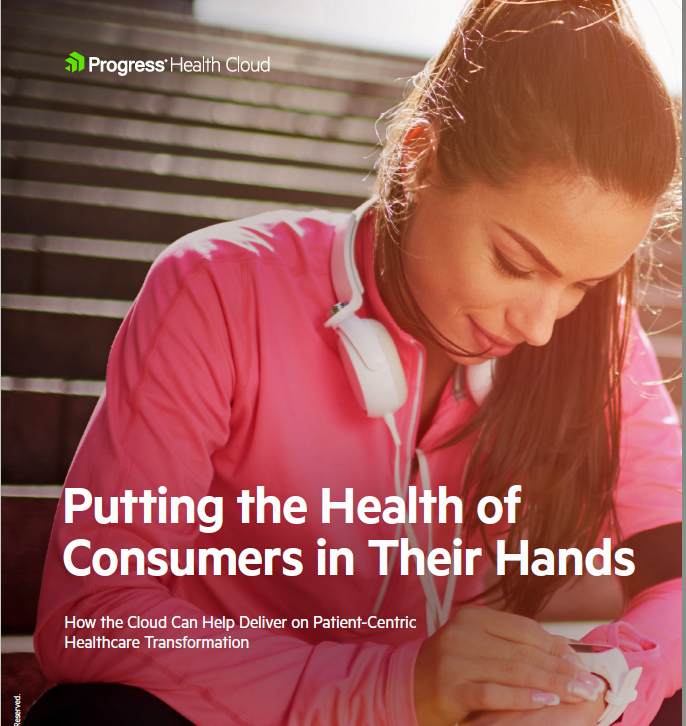
On July 18, 2017, Neil Gomes, Chief Digital Officer at Thomas Jefferson University and Jefferson Health in Philadelphia, tweeted this: When I saw this tweet, I was especially struck by Gomes’s phrase, “Designed & developed with heart/love by my @DICEGRP.” That’s Jefferson’s health solutions group that focuses on digital innovation and consumer experience. Here’s a health system that’s focused on that customer experience, which has become a critical success factor for healthcare to thrive. That’s because, as Steve Laughlin, VP and General Manager of IBM’s Global Consumer Group recently explained to me, a consumer’s last great customer experience becomes the
Healthcare EveryWhere: Philips and American Well Streamline Telehealth

Two mature companies in their respective healthcare spaces came together earlier this month to extend healthcare services where patients live and doctors work, via telehealth services. Philips, celebrating 127 years in business this year, has gone all-in on digital health across the continuum of care, from prevention and healthy living to the ICU and hospital emergency department. American Well is among the longest operating telehealth companies, founded in 2006. Together, these two established organizations will transcend physician offices and ERs and deliver virtual care in and beyond the U.S. I had the opportunity to sit down with Ido Schoenberg, MD,
What Healthcare Can Learn from A Pig and Piggy Bank via Santander Bank

When patients feel disrespected in a medical exam room, they will be less likely to follow instructions they receive from a doctor. Research from the Altarum Institute revealed this fundamental finding. The chart shows that feeling respected reduces a patient’s diabetes medication adherence by a factor of nearly 2x, and is a risk factor for poorly managed diabetes. Furthermore, consumers who feel disrespected by providers are three times more likely to not believe doctors are accurate sources of information than consumers who do feel respected. And, patients with diabetes who do not feel respected are one-third more likely to have poorly
What A Duck Can Teach Us at CES 2018

We’re spending more time at CES 2018 calling out the societal and health impacts of technologies, especially for children and under-served people. How surprised and delighted I am to find a positive, enchanting impact at the convergence of kids and tech…from a duck. When I say “duck,” there are a few images that probably swim up in your mind’s eye: Donald, Daisy, Daffy, Howard, Darkwing, and the brand-famous Aflac Duck (who has his own Twitter handle @AflacDuck). It’s this last-named web-footed feathered friend who is a major star here at CES 2018 in the persona of My Special Aflac Duck.
What Healthcare Can Learn from Volkswagen: A Scenario of a Post-Healthcare World
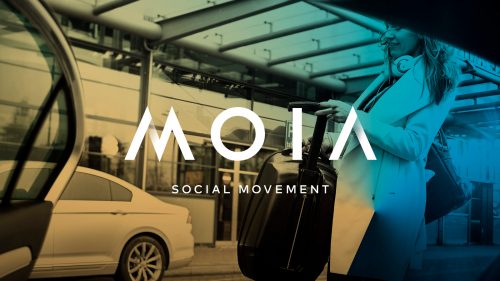
As I am finalizing my schedule for meet-ups at CES in Las Vegas for early January 2018, I’m thinking about digital devices and wearable tech, connected cars, smart homes, and the Internet of Things through my all-health, all-the-time lens. My friends at TrendWatching write today about the automaker, Volkswagen, which has a division called MOIA started in 2016. VW, like most car manufacturers, is working on strategies to avoid being disrupted and made irrelevant as tectonic forces like autonomous cars and shared rides innovate and re-define the nature of personal transportation. MOIA is a brand and a self-described “social movement.”
Health Consumers Face the New Year Concerned About Costs, Security and Caring – Health Populi’s 2018 Forecast
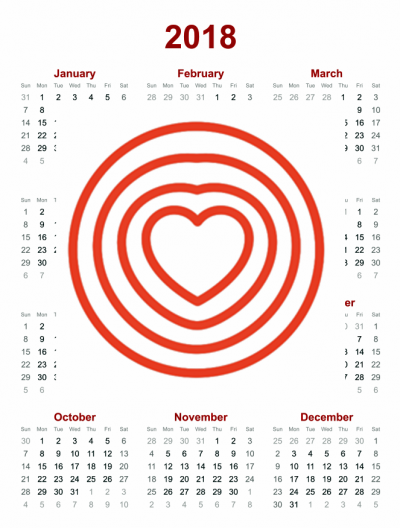
As 2018 approaches, consumers will gather healthy New Year’s Resolutions together. Entering the New Year, most Americans are also dealing with concerns about healthcare costs, cybersecurity, and caring – for physical health, mental stress, and the nation. Healthcare costs continue to be top-of-mind for consumer pocketbook issues. Entrenched frugality is the new consumer ethos. While the economy might be statistically improving, American consumers’ haven’t regained confidence. In 2018, frugality will impact how people look at healthcare costs. 88% of US consumers are likely to consider cost when selecting a healthcare provider, a Conduent survey found. Physicians know this: 81% of
Consumers Seek Health Engagement Everywhere: the Case for Alcohol and Breweries

More consumers are seeking health-making opportunities everywhere, both within and outside of traditional healthcare touch-points. That includes peoples’ consumption of beer. We learned from the Edelman Health Engagement Barometer that consumers seek to engage for health beyond healthcare organizations – namely, hospitals, providers, over-the-counter medicines, pharma and insurance. What was perhaps the most surprising industry segment consumers called on for personal health engagement was brewing and alcohol. Fully 8 in 10 consumers expect brewing and spirits companies to engage in health. The bar chart shows this finding, arraying beer and liquor producers on par with retail and consumer technology, along
Stress is US: Health Care Is the #1 Stressor in America
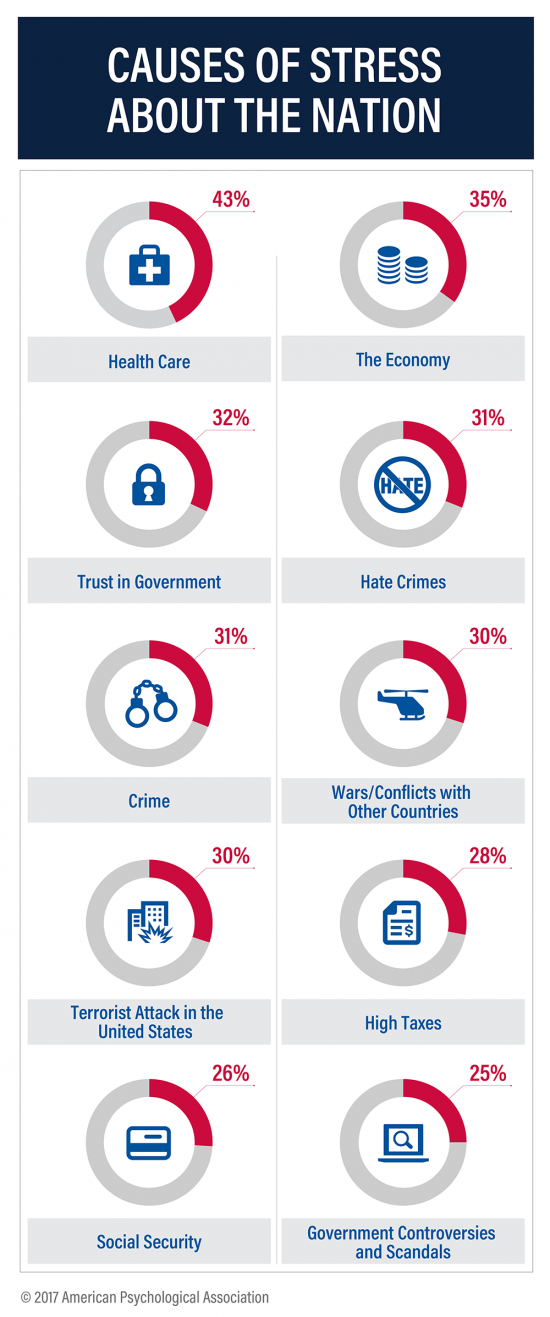
Above the economy, trust in government, crime, war, terrorism, and taxes, health care is the top cause of stress in America. For ten years, the American Psychological Association has gauged Americans’ collective mood in their ongoing study, Stress in America. The latest report is The State of Our Nation, published this month, finding that we’re at the “lowest point in our nation’s history” according to 59% of Americans. The 2016 national election in the U.S. raised the stress-stakes, when APA released a stress study we discussed here in Health Populi. The election season was a source of stress for 52%
Rx Delivery to the Patient’s Door: Home Is Where the Health/Care Is

Talk about the last mile in healthcare. CVS Pharmacy will deliver prescription drugs to patients’ homes, the company announced this week. “Same-day prescription delivery gives customers the easy option of having the pharmacy they trust deliver right to their front door at no cost,” Helen Foulkes, President of CVS Pharmacy, said in the press release. Rx home delivery may not be “the” last mile to conquer all healthcare access challenges, but it’s nonetheless a signal that healthcare industry suppliers are focusing on helping patients streamline their health-consumer lives. In this case, it’s also CVS morphing towards Amazon’s Prime delivery model. Amazon
In the Post-Weinstein Era, How to Market Health to Women: Philips, Kalenji, and Libresse Getting It Right

“With Mad Men still in charge, ad campaigns miss the mark,” an editorial published this week in the Financial Times asserts. Leave it to a fiscally conservative British publication to be spot-on about a particularly, but not uniquely, American challenge, in this post-Weinstein (Miramax), -Price (Amazon), and today, -Halperin (MSNBC) moment of sexual harassment revelations. In health/care, women are key consumers, buyers and influencers, yet under-represented in the Mad Men demographic of senior advertising executives, as the data-driven FT essay points out. So it’s especially heartening to find this month a few examples of empowering, inspiring ad campaigns getting health/care marketing
Health (Healthcare, Not So Much) Abounds in Prophet’s Top 50 Brands
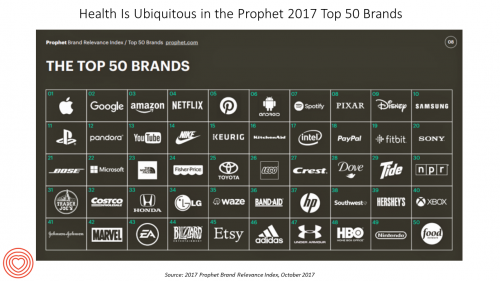
U.S. consumers’ most-valued brands include Apple, Google, Amazon, Netflix, Pinterest, Android, Spotify, PIXAR, Disney and Samsung, according to the 2017 Brand Relevance Index from Prophet. The top 50 are shown in the first chart. On the second chart, I’ve circled in red the brands that have reach into healthcare, health, fitness, and wellness. Arguably, I could have circled every brand in the top 50 because in one way or another, depending on the individual, people find health “everywhere” that’s relevant to them based on their own definitions and value-systems. This is Prophet’s third year conducting this study, and I was
Most Consumers Would Trust a Health Info Site “Prescribed” by Their Doctor
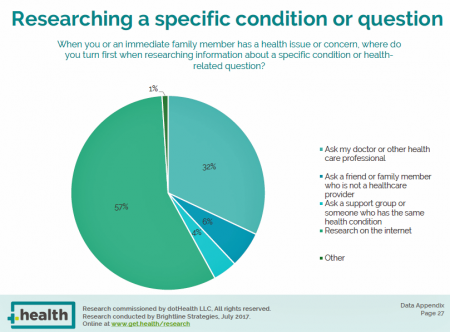
Most consumers access the Internet for health information before they ask their doctor for the same information. But virtually everyone who goes online for health information would trust a website recommended to them by their doctor, according to the dotHealth Consumer Health Online – 2017 Research Report. This survey was conducted on behalf of dotHealth, an internet registry company channeling “.health” domains to organizations in the broad health and healthcare landscape. [FYI, both Health Populi and JaneSarasohnKahn are also registered with .health domains, having availed ourselves of this service at launch]. Six in 10 consumers who have used the internet in the
What Patients Feel About Technology, Healthcare Costs and Social Determinants
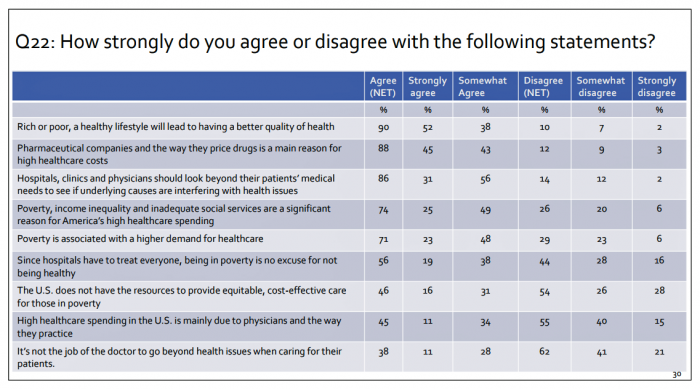
U.S. consumers feel positive about the roles of technology and social determinants in improving healthcare, but are concerned about costs, according to the 2017 Patient Survey Report conducted for The Physicians Foundation. The survey gauged patients’ perspectives across four issues: the physician-patient relationship, the cost of healthcare, social determinants of health, and lifestyle choices. Two key threads in the research explain how Americans feel about healthcare in the U.S. at this moment: the role of technology and the cost of health care. First, the vast majority of consumers view technology, broadly defined, as important for their health care. 85% of people
To Meet Health Consumers’ Digital Demands, Think Netflix and Verizon
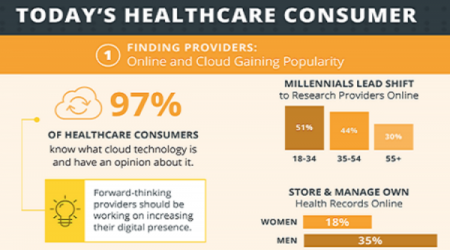
Health consumers have become savvy about the role of technology in their healthcare, according to a survey from Ambra, a company that is in the health cloud business. The survey paints a picture of health consumers hungry for digital health connections. The most popular activities patients do online for health were: To research symptoms and treatments To renew and/or fill prescriptions To view lab reports To make appointments To pay medical bills To correspond with the nurse or doctor To view imaging reports To get virtual care, and, To participate in patient communities. To meet patients where they want
Celebrating 10 Years of Health Populi, 10 Healthcare Milestones and Learnings

Happy anniversary to me…well, to the Health Populi blog! It’s ten years this week since I launched this site, to share my (then) 20 years of experience advising health care stakeholders in the U.S. and Europe at the convergence of health, economics, technology, and people. To celebrate the decade’s worth of 1,791 posts here on Health Populi (all written by me in my independent voice), I’ll offer ten health/care milestones that represent key themes covered from early September 2007 through to today… 1. Healthcare is one-fifth of the national U.S. economy, and the top worrisome line item in the American
Price-Shopping for Healthcare Still A Heavy Lift for Consumers
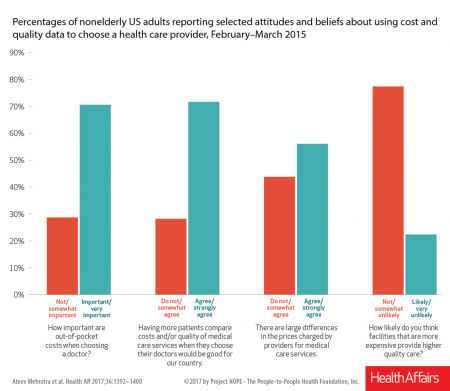
Most U.S. consumers support the idea of price-shopping for healthcare, but don’t practice it. While patients “should” shop for health care and perceive differences in costs across providers, few seek information about their personal out-of-pocket costs before getting treatment. Few Americans shop around for health care, even when insured under a high-deductible health plan, conclude Ateev Mehrotra and colleagues in their research paper, Americans Support Price Shopping For Health Care, But Few Actually Seek Out Price Information. The article is published in Health Affairs‘ August 2017 issue. The bar chart shows some of the survey results, with the top-line finding
Health Equity Lessons from July 23, 1967, Detroit

On July 23, 1967, I was a little girl wearing a pretty dress, attending my cousin’s wedding at a swanky hotel in mid-town Detroit. Driving home with my parents and sisters after the wedding, the radio news channel warned us of the blazing fires that were burning in a part of the city not far from where we were on a highway leading out to the suburbs. Fifty years and five days later, I am addressing the subject of health equity at a speech over breakfast at the American Hospital Association 25th Annual Health Leadership Summit today. In my talk,
Weaving Accenture’s Five Digital Health Technology Trends for 2017
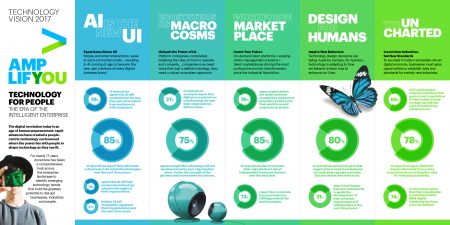
Technology should serve people, and Accenture has identified five major key trends that, together, could forge a person-centered, -friendly, -empowering healthcare system. This is Accenture’s Digital Health Technology Vision for 2017. “Should” and “could” are the important adverbs here, because if tech doesn’t deliver, driving efficiency and effectiveness, personalizing medical treatments, and inspiring people to become more health literate and health-engaging, then tech is just a Field of Dreams being built and available, with no people taking advantage of the potential benefits. The five new-new tech trends are: AI is the new UI, where healthcare experience is everything Ecosystem power
Note to Mooch: The ER is Not Universal Health Care

I quote directly from the Twitter feed of Anthony Scaramucci, @scaramucci: “@dhank2525 agree. We already have Univ Health Care, we made decision long ago to treat everyone that enters an emergency room.” Mr. Scaramucci is President Trump’s Communications Chief, replacing Sean Spicer. Mr. Scaramucci is neither veteran journalist nor healthcare policy wonk. He’s a successful businessman, which I respect for his savvy and ability to build a fund, attract investors, and create a media persona which he has telegenically broadcast on CNBC and elsewhere over the past decade. He’s got a engaging public personality, and goes by the moniker, “Mooch.” But
Global Drug Sales Forecasts Fall For Next Five Years
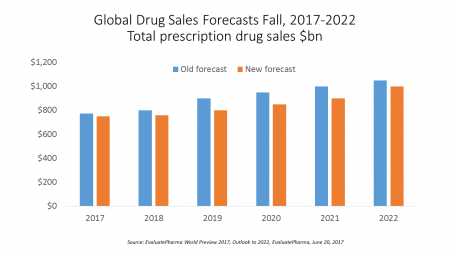
Total prescription drug sales have been trimmed, based on calculations of EvaluatePharma which forecasts a $390 bn drop in revenues between 2017 and 2022. “Political and public scrutiny over pricing of both new and old drugs is not going to go away,” EvaluatePharma called out in its report. The intense scrutiny on pharma industry pricing was fostered by Martin Shkreli in his pricing of Daraprim (taking a $13.50 product raising the price to $750), Harvoni and Sovaldi pricing for Hepatitis C therapies, and last year’s EpiPen pricing uproar. A May 2017 analysis of prescription drug costs by AARP judges that, “Nothing
Helping People On A Path to Better Health with CVS @Retail
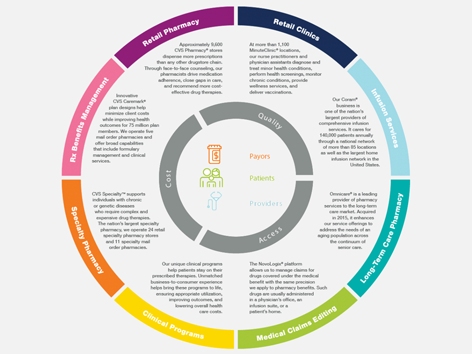
“Helping people on their path to better health” is the mission-mantra of CVS Health. Re-branded from its previous identity as CVS/pharmacy, the organization convened a Health Innovation Summit with its vendor partners whose products fill the front-of-store shelves to empower, inspire and support consumers to manage health and wellness for themselves and their families. I was grateful for the opportunity to provide the first talk for the day, setting the context for the evolving retail health/care landscape with the consumer at the center. The consumer is, at any point in a 24-hour day: a person wearing many hats (a worker,
U.S. Consumers Expect, But Don’t See, Innovation From the Health & Wellness Industry
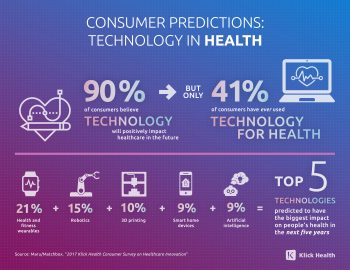
U.S. consumers consider Consumer Electronics to be the most innovative industry they know. But people believe that Health & Wellness should be the most innovative sector in the economy. Welcome to the 2017 Klick Health Consumer Survey, which focuses on health innovation in the context of peoples’ hopes for technology to improve health and healthcare. 1 in 2 people say that technology has had a positive impact on their health and wellness, skewing slightly more toward younger people (although 45% of people 55 years of age and older agree that tech positively contributes to health. 41% of consumers say they’ve
Amazon’s Health Care Building Blocks
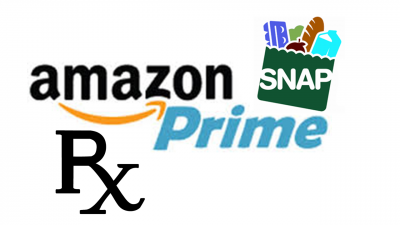
In the past few weeks, two announcements from Amazon point to a strategy, whether intended or my dot-connecting, that the ecommerce leader has the health of its customers in its sights. In late May, CNBC first published the news that Amazon was seeking out a candidate to be a general manager for a pharmacy business. Here’s the video telling the story. Getting into the retail pharmacy channel is in itself a huge message to this health industry segment, which is very competitive between chain pharmacies (led by CVS, Walgreens, and Rite-Aid), grocery pharmacies (the largest of which are Kroger and
A New Health Risk: Hacked Personal Medical Devices
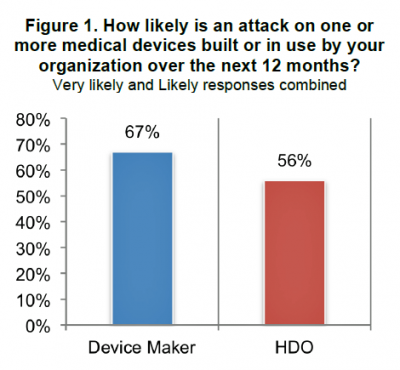
We have entered an era of insecurity in healthcare in America. While major attention is being paid to healthcare insurance and service insecurity, food insecurity and financial insecurity, there’s another one to add to this list: medical device security. As more medical devices have moved into the digital internet-connected mode, the risk for malware, ransomware, and overall hack-ability grows. This increasing and challenging risk is covered in the report, Medical Device Security: An Industry Under Attack and Unprepared to Defend from Ponemon Institute. Ponemon Institute has been tracking information security across industries, including healthcare, for several years. In this survey, sponsored
The Consumer Trust Deficit In Health Engagement
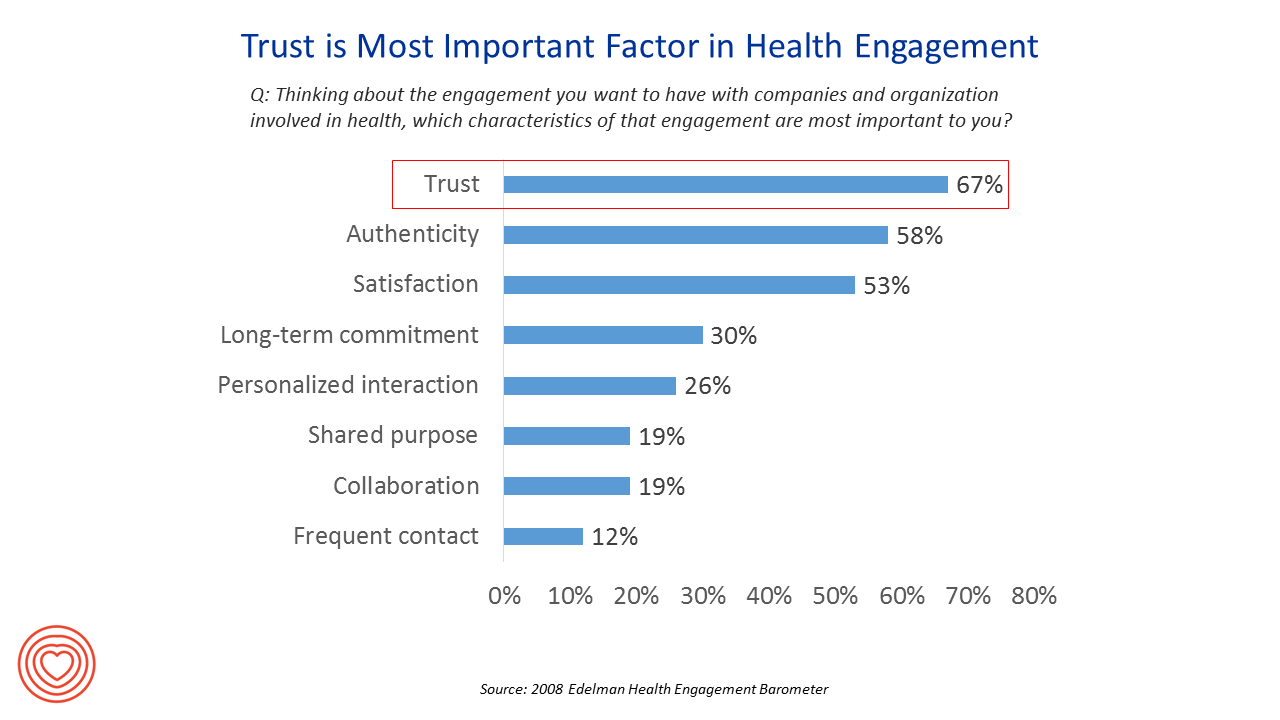
While trust in major institutions is eroding the world over, peoples’ trust in healthcare is on the rise, according to the 2017 Edelman Trust Barometer. Still, compared to other industry sectors, healthcare is still barely positive — and just one spot ahead of financial services. When it comes to trust, “the healthcare industry is making slow but steady progress,” notes Kym White who leads Edelman’s healthcare practices. Consumers’ trust in the five healthcare segments of pharmaceutical/drug companies, consumer health/over the counter, biotech/life sciences, insurance and hospitals/clinics is improving over 2016. In the U.S., for pharma and biotech, trust is reversing a
Americans Say Healthcare is the Nation’s #1 Problem – Tied with Dissatisfaction with Government
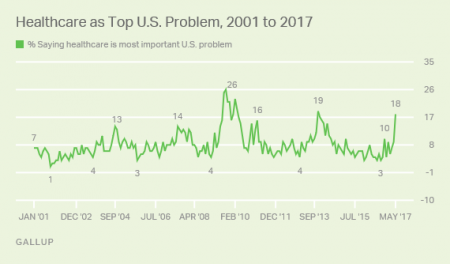
Healthcare tops the list of Americans’ concerns, tied with a dissatisfaction for government, this month (May 2017). According to a Gallup poll published 12 May, poor government leadership and healthcare are together the most important problem currently facing the U.S. Immigration, the economy, jobs, and race relations are distance 3rd places in this survey, which was conducted during the first week of May 2017 among 1,011 U.S. adults 18 years and older. The highest percent of Americans citing healthcare as America’s most important problem was 26%, found in August/September 2008 when town hall meetings round the country were protesting healthcare
Building Digital Trust Is Now Part of Serving Up Healthcare
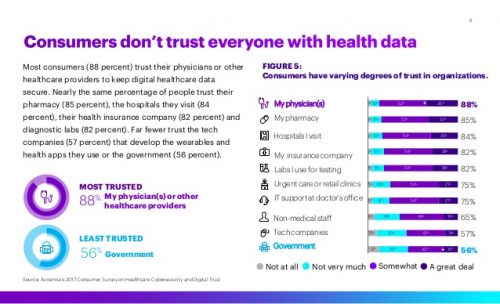
The most trusted stewards for protecting consumers’ health data are “my providers:” “my” physician (88%), “my” pharmacy (85%), and “my” hospital” (84%). according to the Accenture 2017 Consumer Survey on Healthcare Cybersecurity and Digital Trust. Who’s least-trusted? Government (56%) and tech companies (57%). Note, though, that most Americans (over 50%) trust these health data holders — it’s just that fewer people trust them than healthcare providers, who are top health information protectors in health consumers’ trust rosters. Accenture commissioned Nielsen to conduct this survey in November 2016 in seven countries. The results discussed here in Health Populi focus on the
Healthier Eating Is the Peoples’ Health Reform: the Gallup-Sharecare Well-Being Index
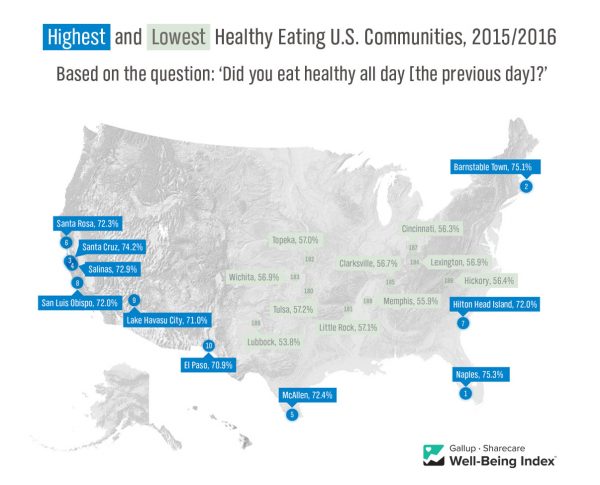
The top healthiest eating communities tend to circle the perimeter of the map of the lower 48 U.S. states. In these towns, more than 72% of health citizens report healthy eating. These areas are located in California, Florida, and Massachusetts, among others. Areas with the lowest rates of healthy eating are concentrated generally south of the Mason-Dixon Line, in places like Arkansas, Kentucky, and Mississippi, and other states. In these places, fewer than 57% of people eat healthy. Eating healthy foods in moderation is a mighty contributor to personal and public health, discussed in the report, State of American Well-Being
Consumer Healthcare Reviews on Yelp Help
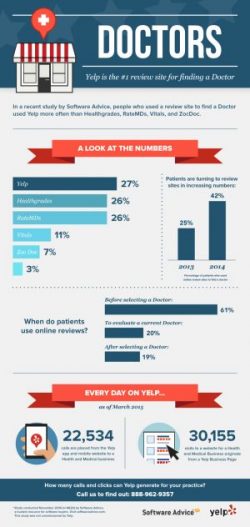
Just as consumers use TripAdvisor, Zagat, OpenTable, and their Facebook pages to review restaurants, hotels, automobiles, and financial services companies, many patients – now health consumers in earnest – have taken to reviewing healthcare services in social networks. Finding reliable, understandable information about healthcare quality and prices is very challenging for most consumers. Are healthcare reviews on social networks statistically valid? An analysis of consumer ratings for New York State hospitals on Yelp, the social network, were positively correlated to objective scores of hospital quality, according to the research published in Yelp for Health: Using the Wisdom of Crowds to
Finding Health in Consumer Goods
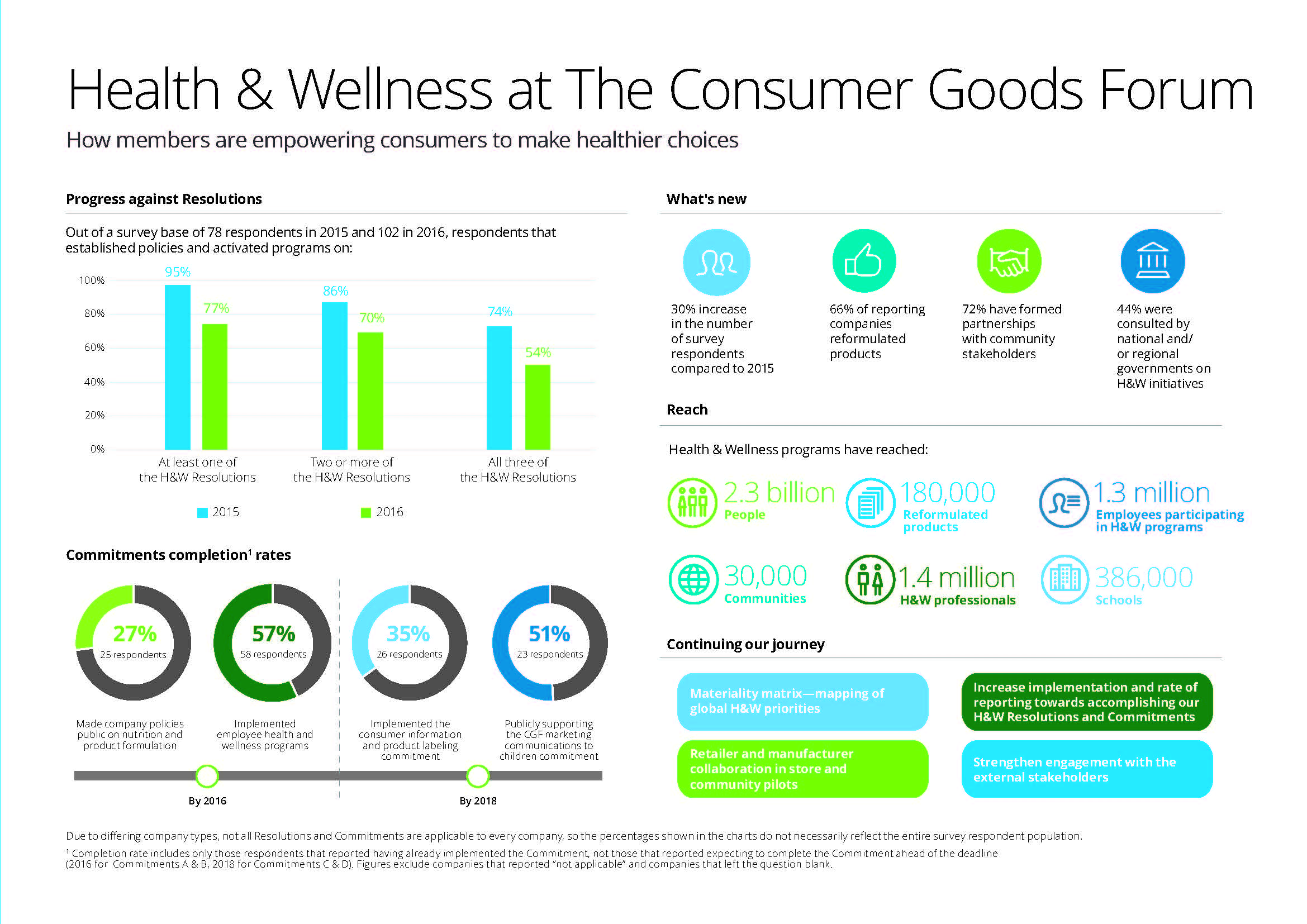
People want to live healthier lives, and consumer good companies are responding to these demands to keep and gain market share and profit margins. Consumer product firms reformulated over 180,000 consumer products in 2016 for in response to consumers’ health and wellness wishes, based on data collected by Deloitte for The Consumer Goods Forum project (CGF) and published in The CGF Health & Wellness Progress Report. The CGF is an industry network of some 400 consumer goods, retail, and service companies supporting the global adoption of standards and practices. This Report focused on the CGF members’ progress toward health and wellness
Health Insurance Plans Rank Lowest In Consumer Experience
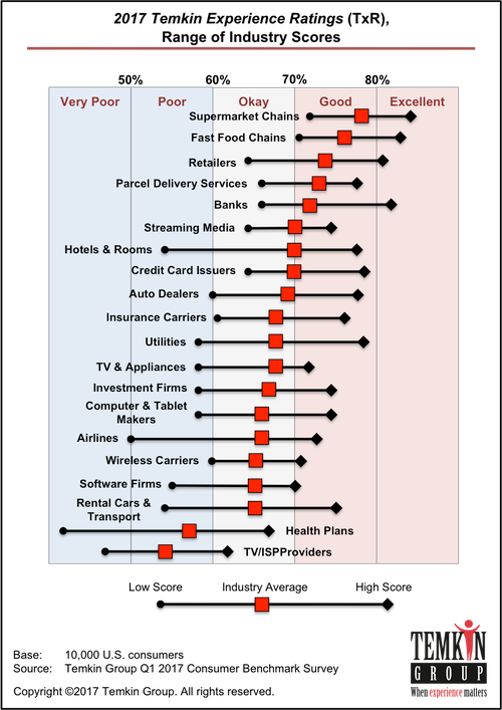
Consumers love their supermarkets, fast food shops, retailers, delivery services, and banks. These industries rank highest in the 2017 Temkin Experience Ratings, my go-to source for understanding consumer service Nirvana. Health insurance companies and internet service providers (ISPs) are at the bottom of the Temkin Ratings, as shown in the first chart. Note that health plans range from a score approaching 70 to under 50, illustrating the very wide range of consumer experience from okay-to-good, too very poor. The top-ranked health plan was Kaiser Permanente, with a rating of 67%; Health Net was ranked the worst of the health plans
The Fall of the TrumpCare is Retail Health’s Gain in 2017
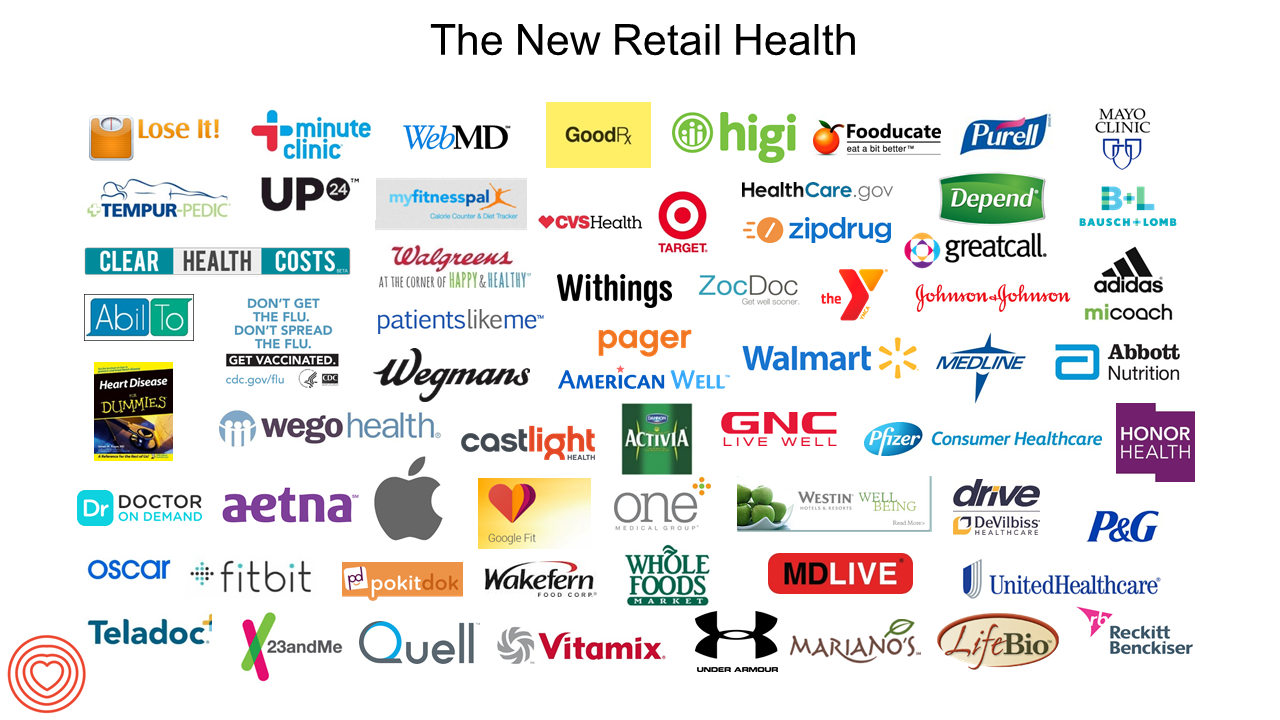
The non-vote for and withdrawal of The American Health Care Act on March 24, 2017, was a win for the retail health market, at least in the short-run. Before the vote, there had been some pronouncements that the passage of the AHCA would have been a boon to retail health. Here’s one story stating that, “A boom in medical tourism to Mexico predicted if Obamacare ends.” Another article asserts, “Why the American Health Care Act Works for Retailers,” a public policy statement from the National Retail Federation (NRF). But NRF, please don’t fret. Retail health is consumer-driven and will persist beyond the
You Are The Expert of Your Own Health: adidas and The Future of Fit
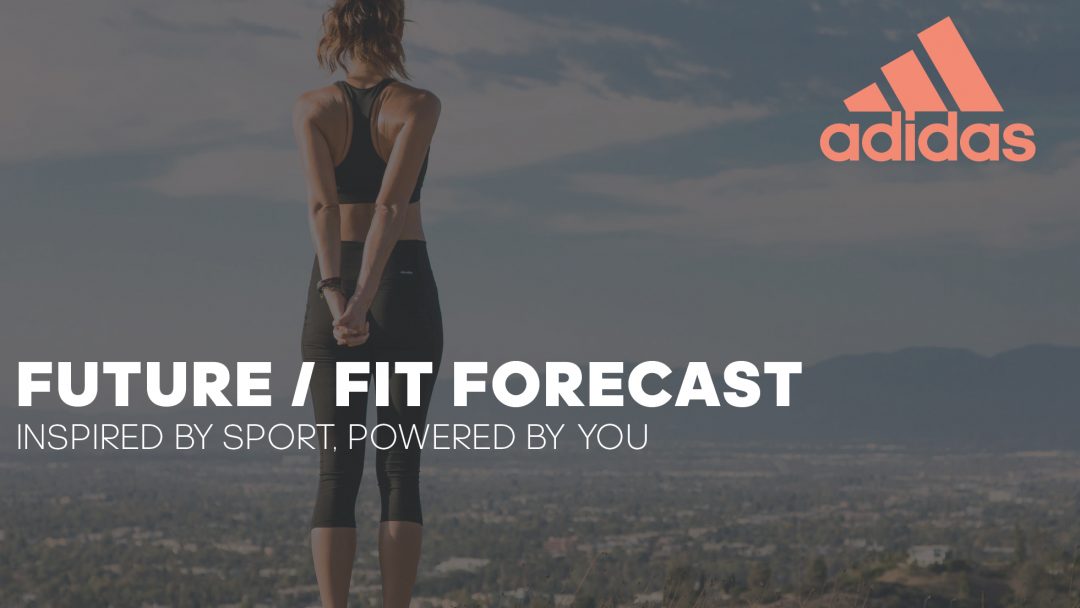
The future of wellness combines: Connected (you) Social IRL (in-real-life) Banishing bad (de-tabooing what’s traditionally seen as “bad”) Humanizing data, and The end of experts. These insights come from adidas, whose team developed a forecast of the future of fit, announced at the 2017 South-by-Southwest Festival in Austin this weekend. I had the honor of participating in this forecast and shepherding the SXSW panel on The End of Experts: Crowdsourcing Your Wellness at the adidas meet-up held over the weekend. The future of fit and wellness is Connected, because we are growing to understand that balancing many elements in our daily
Will Republican Healthcare Policy “Make America Sick Again?” Two New Polls Show Growing Support for ACA

Results of two polls published in the past week, from the Kaiser Family Foundation and Pew Research Center, demonstrate growing support for the Affordable Care Act, aka Obamacare. The Kaiser Health Tracking Poll: Future Directions for the ACA and Medicaid was published 24 February 2017. The first line chart illustrates the results, with the blue line for consumers’ “favorable view” on the ACA crossing several points above the “unfavorable” orange line for the first time since the law was signed in 2010. The margins in February 2017 were 48% favorable, 42% unfavorable. While the majority of Republicans continue to be solidly
Cybersecurity and Healthcare Consumers: My Conversation with Dr. Kaveh Safavi, Accenture

Patients are morphing into consumers, but with eyes wide open: they know about data breaches, and they increasingly demand healthcare services delivered on their own terms. I met with Accenture’s Dr. Kaveh Safavi, Frances Dare, and Jenn Francis at HIMSS17 to discuss their latest research into these two topics. In this post, I’ll cover the growing challenge of cybersecurity and what Accenture learned about consumer data breaches. Tomorrow I’ll discuss Accenture’s latest findings on the expectations of the evolving health/care consumer. [Spoiler alert: personal health information data security is one of those expectations]. At HIMSS17, the issue of cybersecurity is
Patients Anxiously Prep to Be Healthcare Consumers, Alegeus Finds

Healthcare consumers are in a “state of denial,” according to research conducted for Alegeus, the consumer health benefits company. Overall, 3 in 4 consumers feel fear when it comes to their healthcare finances: most people worry about being hit with unexpected healthcare costs they can’t afford, and nearly half fear they won’t be able to afford their family’s healthcare needs. The wordle illustrates consumers’ mixed feelings about healthcare: while people feel frustrated, overwhelmed, powerless, confused and skeptical about healthcare in America, there are some emerging adjectives hinting at growing consumer health muscle-building: optimistic, hopeful, supported, engaged, accountable. Still, denial and
Health Care For All — Only Better, US Consumers Tell Consumer Reports
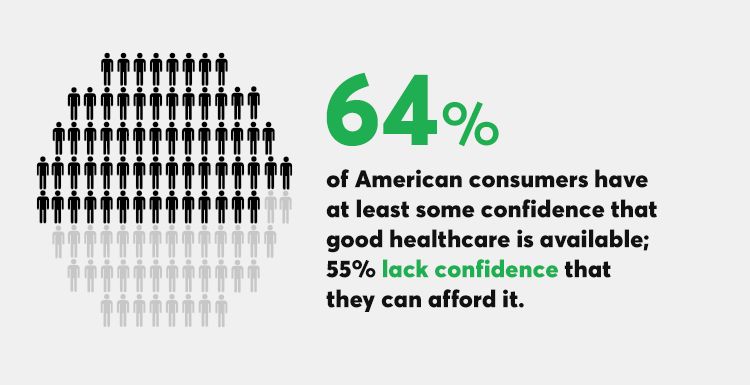
Availability of quality healthcare, followed by affordable care, are the top two issues concerning U.S. consumers surveyed just prior to Donald Trump’s inauguration as the 45th U.S. President. Welcome to Consumer Reports profile of Consumer Voices, As Trump Takes Office, What’s Top of Consumers’ Minds? “Healthcare for All, Only Better,” Consumer Reports summarizes as the top-line finding of the research. 64% of people are confident of having access to good healthcare, but 55% aren’t sure they can afford healthcare insurance to be able to access those services. Costs are too high, and choices in local markets can be spotty or non-existent.
Pharma’s Branding Problem – Profits Over Patients
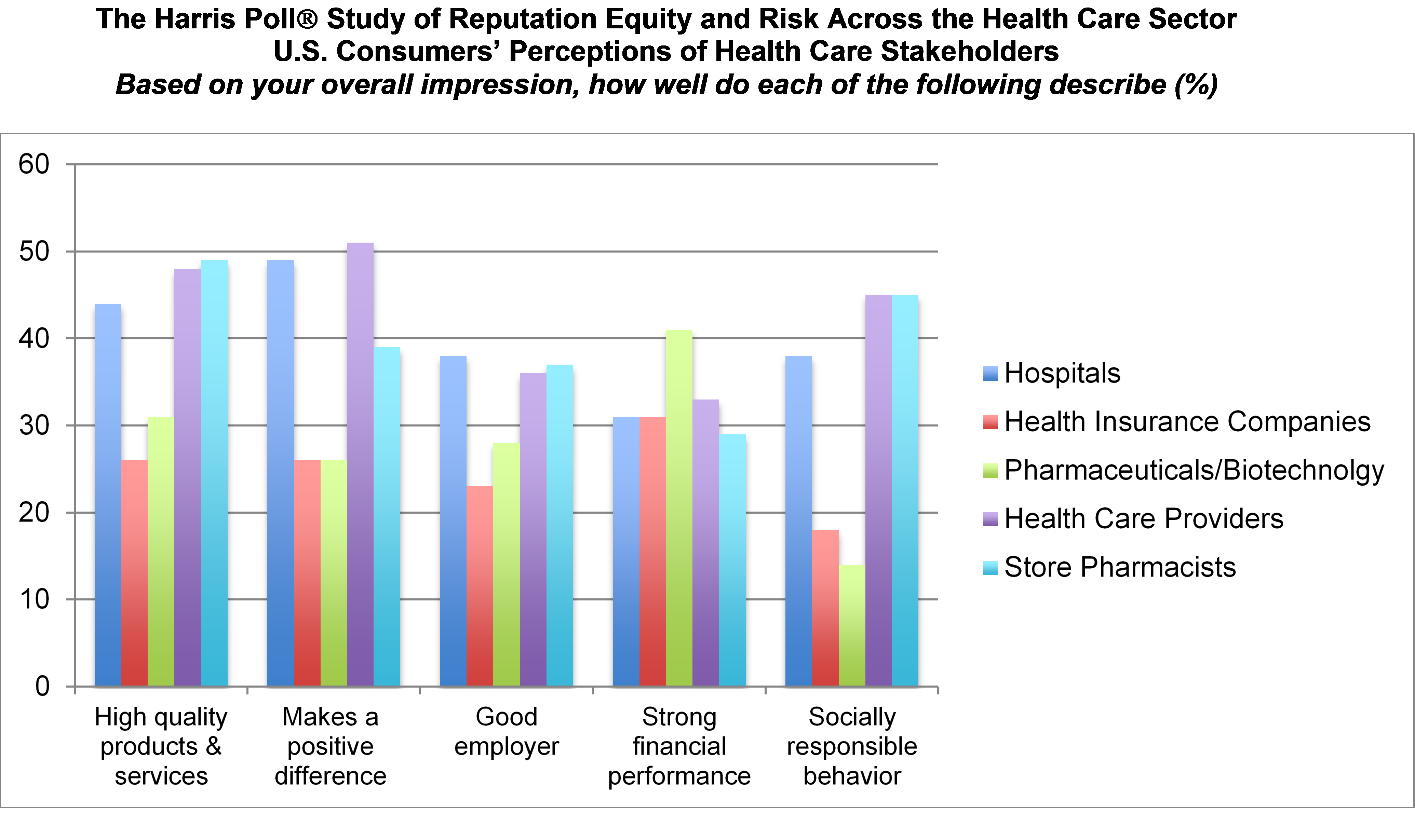
Nine in 10 U.S. consumers think pharma and biotech put profits above patient interests, according to the latest Harris Poll studying reputation equity across organizations serving health care. Notice the relatively low position of the green bars in the first chart (with the exception of the impression for “strong financial performance); these are the pharma/biotech consumer impressions. The health industry stakeholders consumers believe would more likely place them above making money are health care providers, like doctors and nurses, hospitals, and pharmacists. Health insurance companies fare somewhat better than pharma and biotech in this Poll, although rank low on social
Health/Care Data Ecosystems E-merge at CES 2017
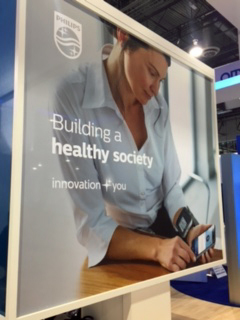
Digital health innovations were fast-proliferating at CES 2017. The bad news is there are so many of them, it’s dizzying and fragmented. The good news is that there are emerging health data ecosystems that will streamline consumers’ user experience so that people can derive knowledge, actionable advice and value out of using these tools. Walking miles of aisles in the Sands Convention Center in the first week of January 2017 can be a dizzying prospect, with hype and best-faces-forward in every single exhibitor at the show. In the health segment at CES, there’s a long list of digital tools to
Nursing Is Seen As The Most Ethical Profession in America; Congress Members, Least
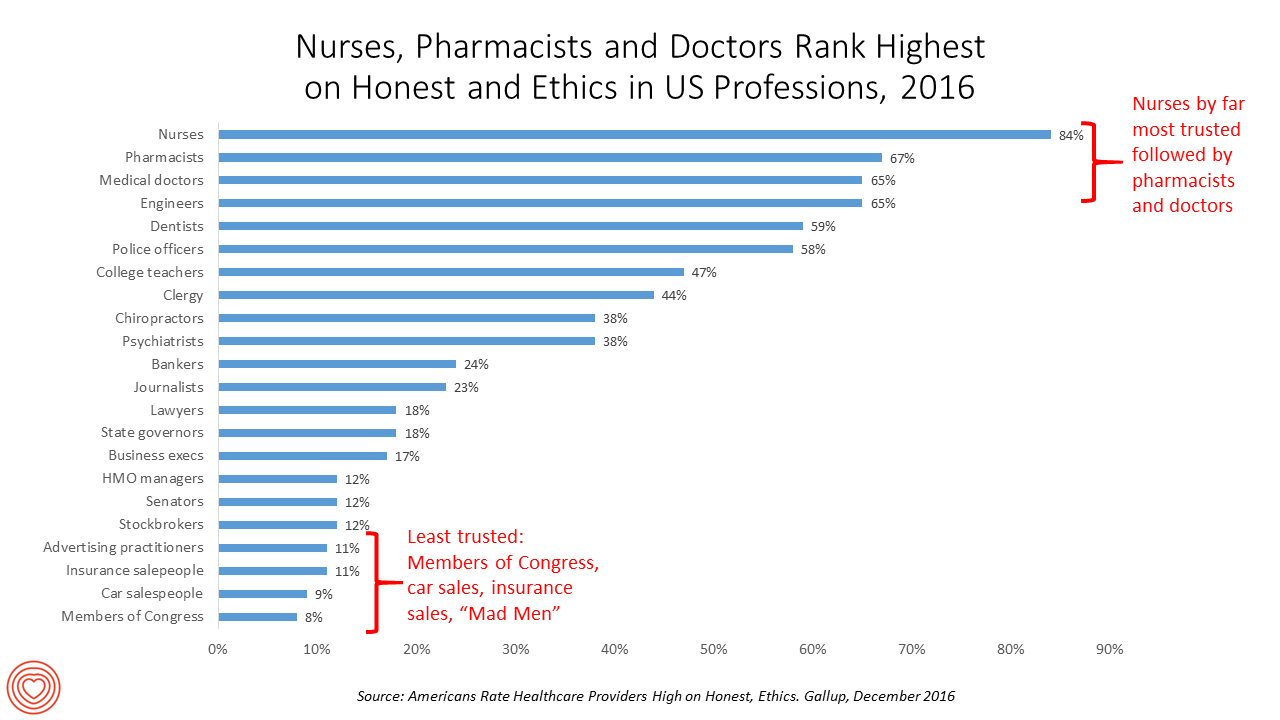
Nurses rank, by far, the top profession for honest and ethics in the U.S. in the 2016 version of the annual Gallup poll on ethics in professions, Americans Rate Healthcare Providers High on Honest, Ethics, published this week. Since 1999, nurses have been #1 in this survey except for the year 2001, when firefighters scored the top spot in light of the 9/11 attack. Another consistency in this survey among U.S. consumers is that pharmacists and physicians top the list once again, after nurses, and the most-trusted professions in America. At the bottom of the roster, as in 2015, are Members
Health Is Personal at the Connected Health Summit
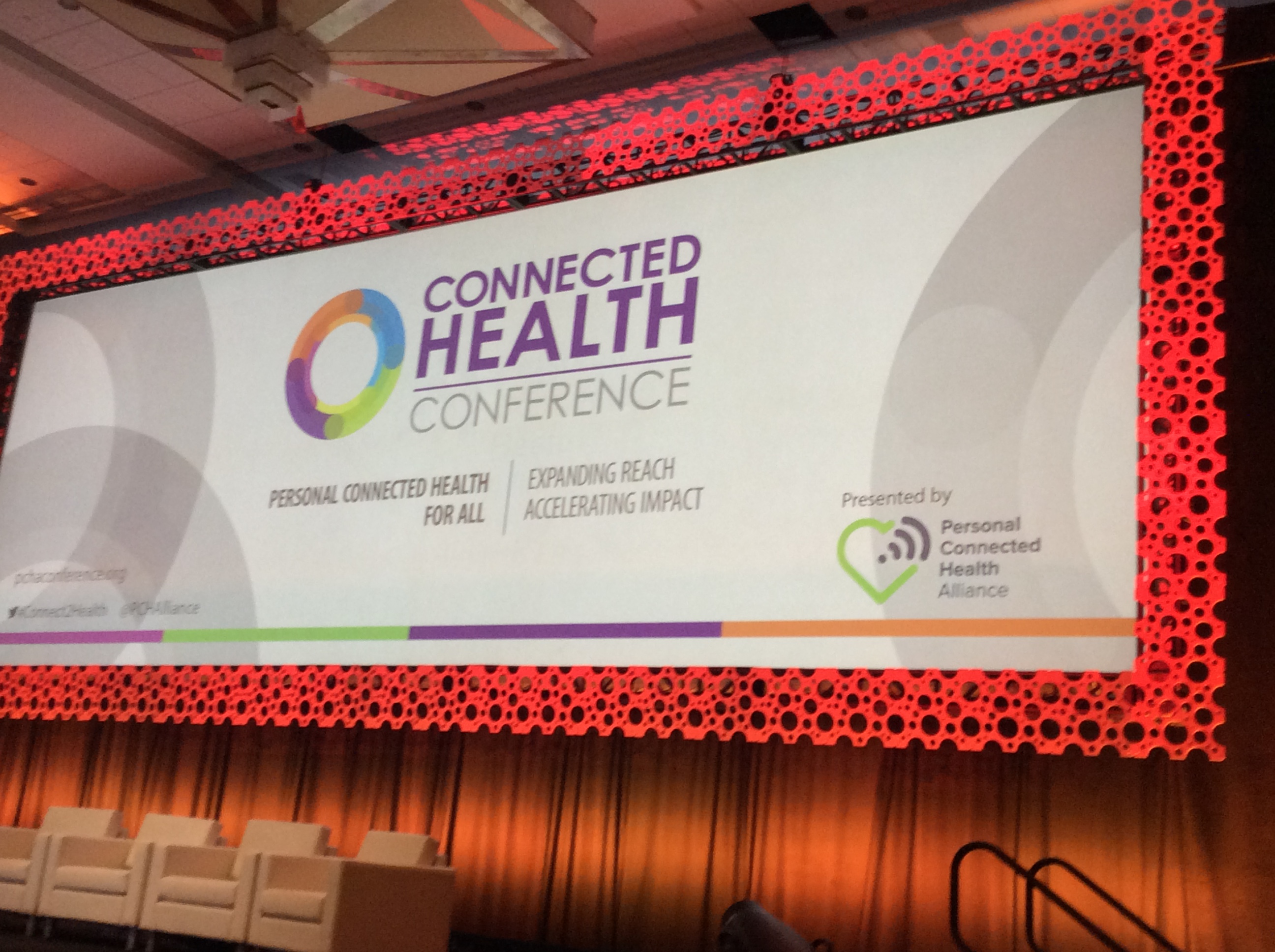
“Because health is personal” is the tagline at the 2016 Connected Health Conference being held at the Gaylord Resort in National Harbor in metro Washington, DC. “Personal,” “Connected,” and “Health” are the three words that comprise the adjectives in the Personal Connected Health Alliance, the host of this conference. PCHA was formed through the merger of HIMSS, the health IT association, and Continua, the organization advocating for health technology “interoperability” — the ability for digital and communications technologies to communicate with each other, to remove friction from health data exchange. This week, PCHA announced that it will bring the Wireless-Life Sciences Alliance into
The Digital Health Gap For High-Cost, High-Need Patients
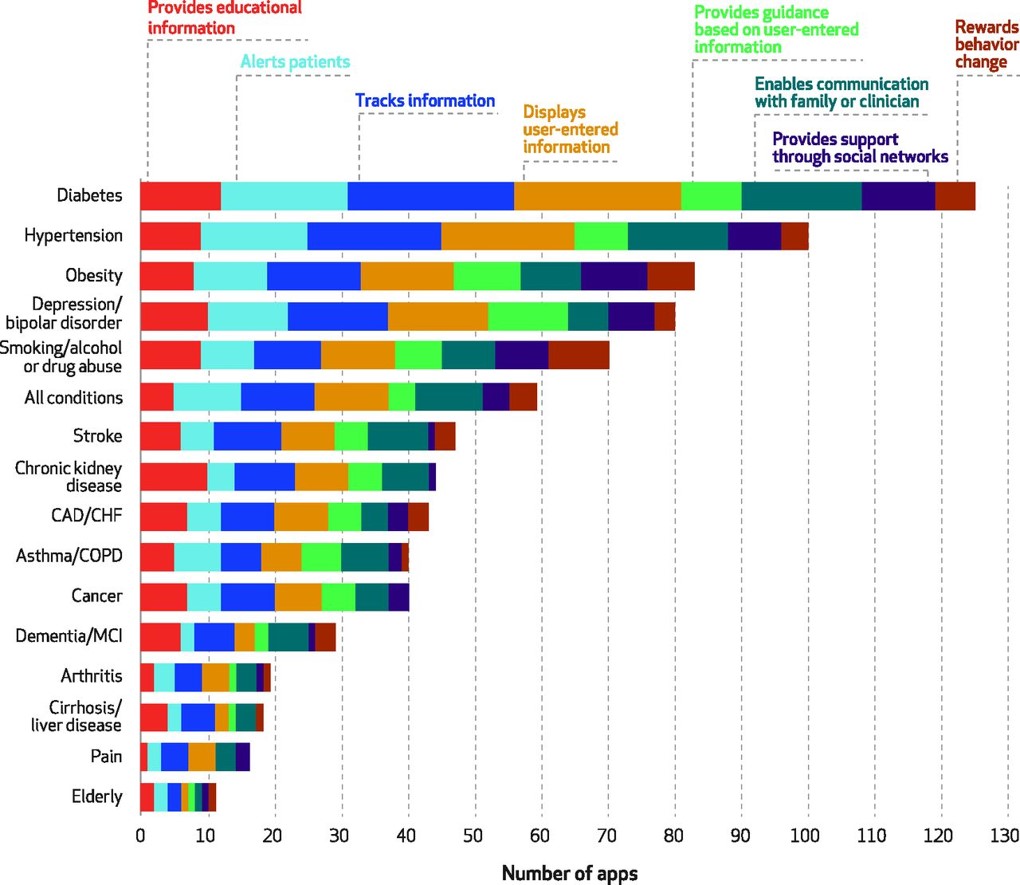
Several market forces are converging that boost patients’ ability to engage in their health and self-care, including peoples’ growing adoption of smartphones, demand for self-service and DIY lifestyles, and Americans’ growing responsibility as health consumers. Health consumers are using a growing array of self-health tools, enabled through digital technologies. However, these tools aren’t yet engaging some of the very people who need them the most: high-need, high-cost patients. Research into this situation is discussed in the December 2016 Health Affairs article, Many Mobile Heaath Apps Target High-Need, High-Cost Populations, But Gaps Remain, published in the December 2016 issue of Health Affairs. For
See Me, Feel Me, Touch Me, Heal Me – What The Who’s Tommy Can Teach Healthcare
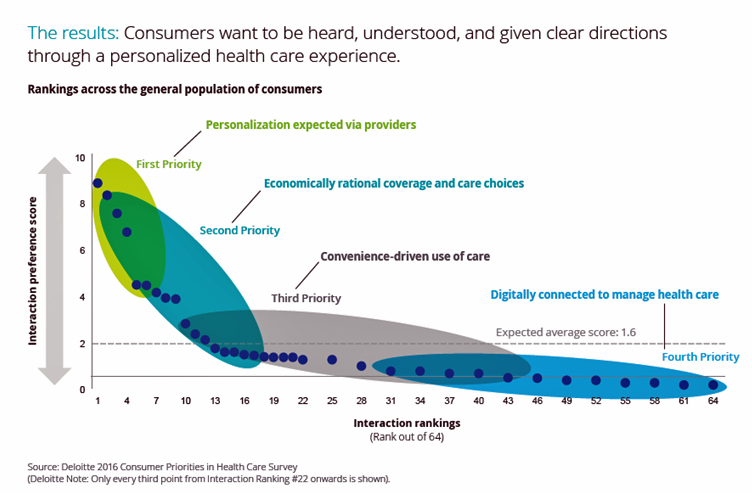
“See me, feel me, touch me, heal me,” is the lyrical refrain from The Who’s Tommy. These eight words summarize what Deloitte has learned from the firm’s latest look into healthcare consumers, published in the report, Health plans: What matters most to the health care consumer. U.S. consumers’ demands for health care are for: Personalization from doctors, hospitals, and other care providers — the most important priority; Economically rational coverage and care choices; Convenience-drive access and care experience; and, Digitally connected care. Personalization is Job 1: “Consumers want to be heard, understood, and given clear directions through a personalized health care
The Patient Is The Best Sensor – Consumers At the Center of Health
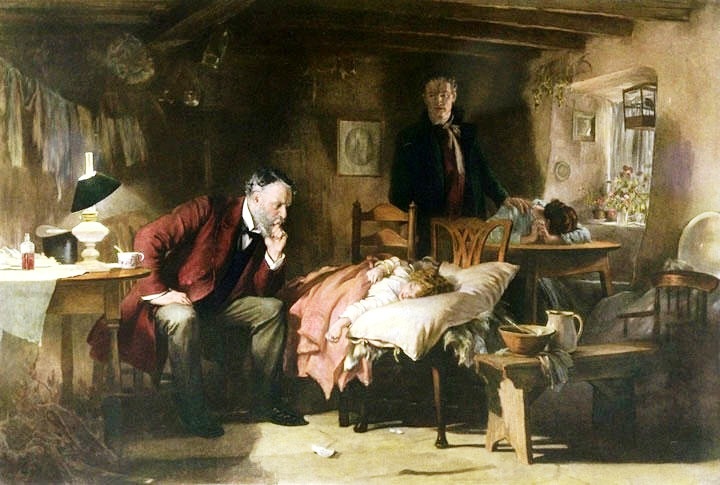
“The patient is the best sensor,” asserted Jamie Heywood, founder of Patients Like Me, during the perennial meeting sponsored by PwC, the 180° Health Forum. This event featured several panels of PwC’s curated group of so-called “provocateurs” in healthcare, and I was grateful to be one of nine selected for the event. Heywood joined Dr. Leanna Wen, Baltimore City Health Commissioner, and me in a panel called, “Strange Bedfellows or Soul Mates? The New Dating Game in Health.” The theme of our collective brainstorm was how collaborations across the ecosystem could help make health and healthcare better. The drawing is
Digital Health Continues to Grow at CES 2017

I attended CES Unveiled in New York this week, which is a preview of what will be featured at the CES in Las Vegas in January 2017. CES, previously known as the Consumer Electronics Show, is celebrating a 50 year anniversary, having been born in Manhattan in 1967 when transistor radios, stereos, and black-and-white TVs were all the rage. Today, CES is the world’s largest innovation event, and the longest-lived. 10 of the original 1967 exhibitors still show at CES, including 3M, Philips, Sharp, SONY, Toshiba, and Westinghouse, among others. Meet George Jetson, who might have been an attendee at
Hospitals Need to Cross the Health Consumer Chasm
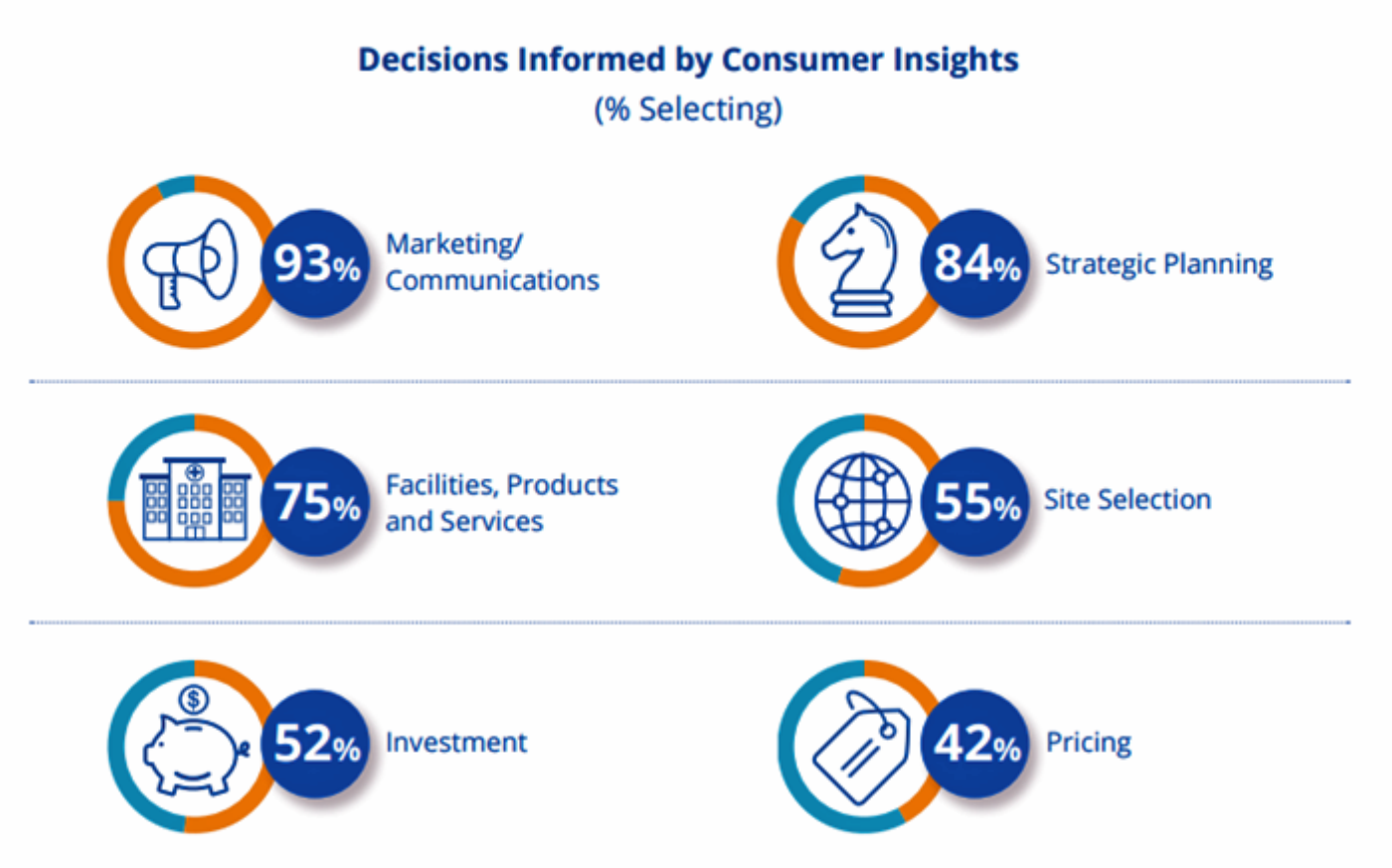
Most U.S. hospitals have not put consumerism into action, a new report from KaufmanHall and Caden’s Consulting asserts from the second paragraph. Patient experience is the highest priority, but has the biggest capability gap for hospitals, the report calls out. KaufmanHall surveyed 1,000 hospital and health system executives in 100 organizations to gauge their perspectives on health consumers and the hospital’s business. KaufmanHall points out several barriers for hospitals working to be consumer-centered: Internal/institutional resistance to change Lack of urgency Competing priorities Skepticism Lack of clarity (vis-a-vis strategic plan) Lack of data and analytics. The key areas identified for consumer centricity
Consumers Feel More Respect from Personal Care and Grocery Brands Than Pharma or Insurance
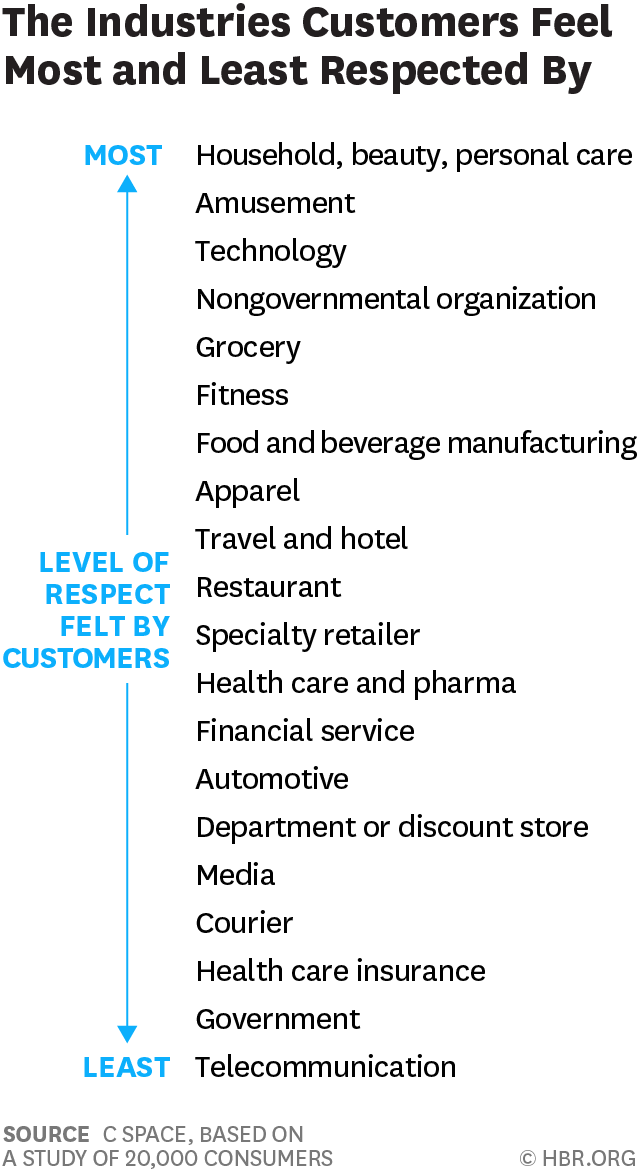
People feel like get-no-respect Rodney Dangerfield when they deal with health insurance, government agencies, or pharma companies. Consumers feel much more love from personal care and beauty companies, grocery and fitness, according to a brand equity study by a team from C Space, published in Harvard Businss Review. As consumer-directed health care (high deductibles, first-dollar payments out-of-pocket) continues to grow, bridging consumer trust and values will be a critical factor for building consumer market share in the expanding retail health landscape. Nine of the top 10 companies C Space identified with the greatest “customer quotient” are adjacent in some way to health:
Americans Have Begun to Raid Retirement Savings for Current Healthcare Costs
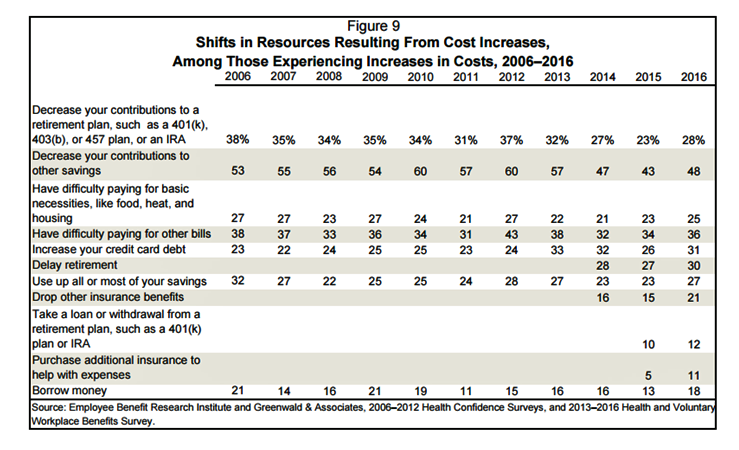
While American workers appreciate the benefits they receive at work, people are concerned about health care costs. And consumers’ collective response to rising health care costs is changing the way they use health care services and products, like prescription drugs. Furthermore, 6 in 10 U.S. health citizens rank healthcare as poor (27%) or fair (33%). This sober profile on healthcare consumers emerges out of survey research conducted by EBRI (the Employee Benefit Research Institute), analyzed in the report Workers Like Their Benefits, Are Confident of Future Availability, But Dissatisfied With the Health Care System and Pessimistic About Future Access and
A New Good Housekeeping Seal for Healthy Food
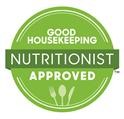
If you need more proof that mainstream consumers are seeking health through the food they buy, look no further than this announcement about the new Good Housekeeping nutrition lab and launch of the new emblem: “nutritionist approved.” The effort is underpinned by the Good Housekeeping Food and Nutrition Brand Lab Incubator, located in the GH Institute in New York City. The goal of the program is to empower consumers to “confidently navigate crowded supermarket shelves and make healthier purchases.” Ultimately, GH hopes to inspire people to make healthier food choices, and to inform food manufacturers with healthy product development and brand
Consumers Seek Quality and Privacy In Tech-Enabled Healthcare

Consumers are open to technology-enabled healthcare, but look to providers to ensure quality and privacy of patients’ personal health information, according to Will Patients and Caregivers Embrace Tech-Enabled Healthcare?, based on the Deloitte 2016 Survey of US Health Care Consumers. Seven in 10 consumers would use at least one of the technologies Deloitte served up in its study, with telemedicine at the top of the list: 49% of people favor telemedicine for post-surgical care, 48% for chronic disease management, 36% for care while traveling, and 32% for minor health issues. While Millennials are generally keener across-the-board for tech-enabled health care,
Knowing And Acting On How Patients Think Will Improve Health and Healthcare
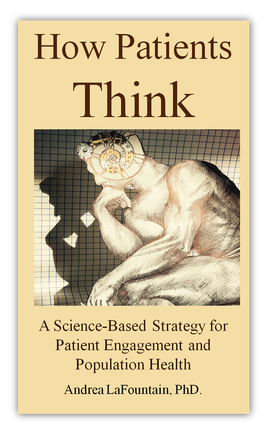
“In the developed world, patient disengagement has become the new killer disease — not the lack of diagnostic devices, trained physicians or efficacious treatment options,” argues Andrea LaFountain, PhD, in her book, How Patients Think. Disbanding prescription drugs in advance of doctors’ instructions, postponing lab and diagnostic tests, and avoiding daily blood glucose testing when managing diabetes are just some examples of “how patients think” about health care and the many tasks involved in caring for oneself and the health of loved ones. But better understanding how patients think — technically speaking, the cognitive neuropsychology underneath the thinking — can
The Future of Retail Health in 2027

As consumers gain more financial skin in the game of paying for health care, we look for more retail-like experiences that reflect the Burger King approach to consuming: having it our way. For health are, that means access, convenience, transparency and fair costs, respect for our time, and a clear value proposition for services rendered. That doesn’t happen so much in the legacy health care system — in hospitals and doctors’ offices. It has already begun to happen in retail health settings and, especially, in the changing nature of pharmacies. Retail Health 2027, a special supplement to Drug Store News
US Health Care Prices Would Be Sticker-Shocking For Europeans
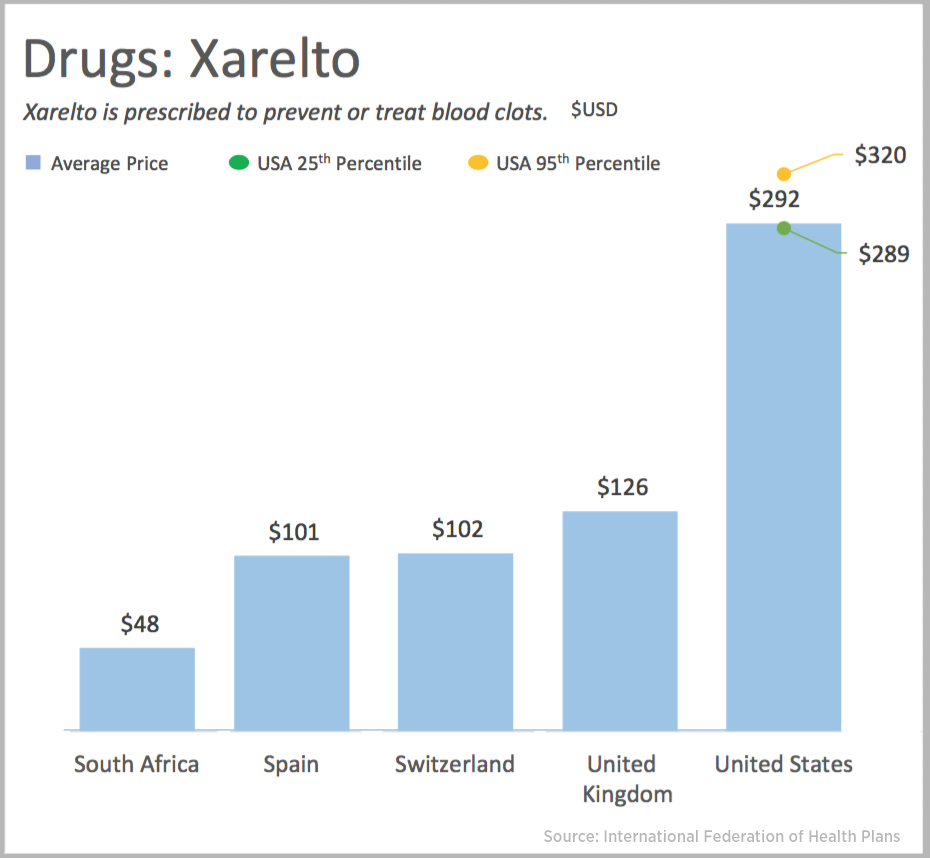
The average hospital cost per day in the U.S. is $5,220. In Switzerland it’s $4,781, and in Spain that inpatient day looks like a bargain at $424. An MRI in the U.S. runs, on average, $1,119. In the UK, that MRI is $788, and in Australia, $215, illustrated in the first chart. Drug prices are strikingly greater in the U.S. versus other developed nations, as shown in the first chart for Xarelto. If you live in the U.S. and have a television tuned in during the six o’clock news, chances are you’ve seen an ad for this drug featuring Arnold
In Healthcare, Pharmacists and Doctors Most Trusted. Insurance Execs and Congress? Not.

When consumers consider the many stakeholder organizations in healthcare, a majority trust pharmacists first, then doctors and dentists. Hospital and health insurance execs, and members of Congress? Hardly, according to a survey from Meyocks, a marketing consultancy. Meyocks conducted the survey via email among 1,170 US adults, 18 years of age and older. This survey correspondends well with the most recent Gallup Poll on most ethical professions, conducted in December 2015. In that study, pharmacists, nurses and doctors come out on top, with advertisers (“Mad Men”), car salespeople, and members of Congress at the bottom, as shown in the second
What Financial Health Means to Me: It’s Baked Into Wellness

Today is Financial Wellness Day. Do you know how financially well you are? Let me take a crack at that answer, even though I haven’t seen your bank account (which you may not even have as over 20% of people in the US are, as financial services companies would call you “un-banked” or “under-banked”.) You have some level of fiscal stress, ranging from a little to a lot. You aren’t taking all of your summer vacation your employer extends to you. You’re spending around $1 in every $5 of your household budget on health care. And your sleep isn’t as
Philips Left Me Breathless With This Video – The Breathless Choir
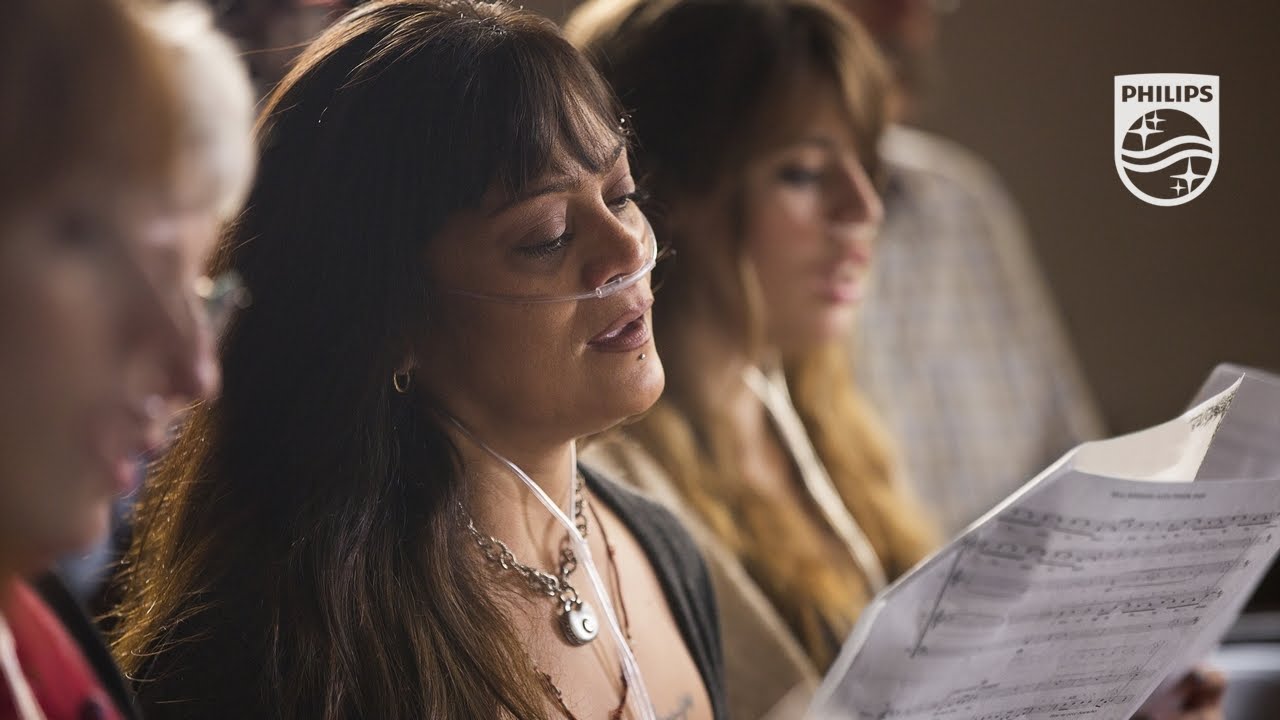
The top award at the annual Cannes Lions International Festival of Creativity for best pharmaceutical advertising campaign went to Philips, the company that’s placing a big corporate bet on digital health. The campaign was called Breathless Choir, and it left me, well, breathless (in a good way). Watch it now. This is how health/care advertising should be done. This inspires health and patient engagement, social connections, and sound self-care principles. Evidence shows that singing in the right way can bolster lung capacity — just what these patients, all dealing with some sort of respiratory condition, must do to enhance their quality
The Primacy of People as Health/Care Goes Digital: Accenture
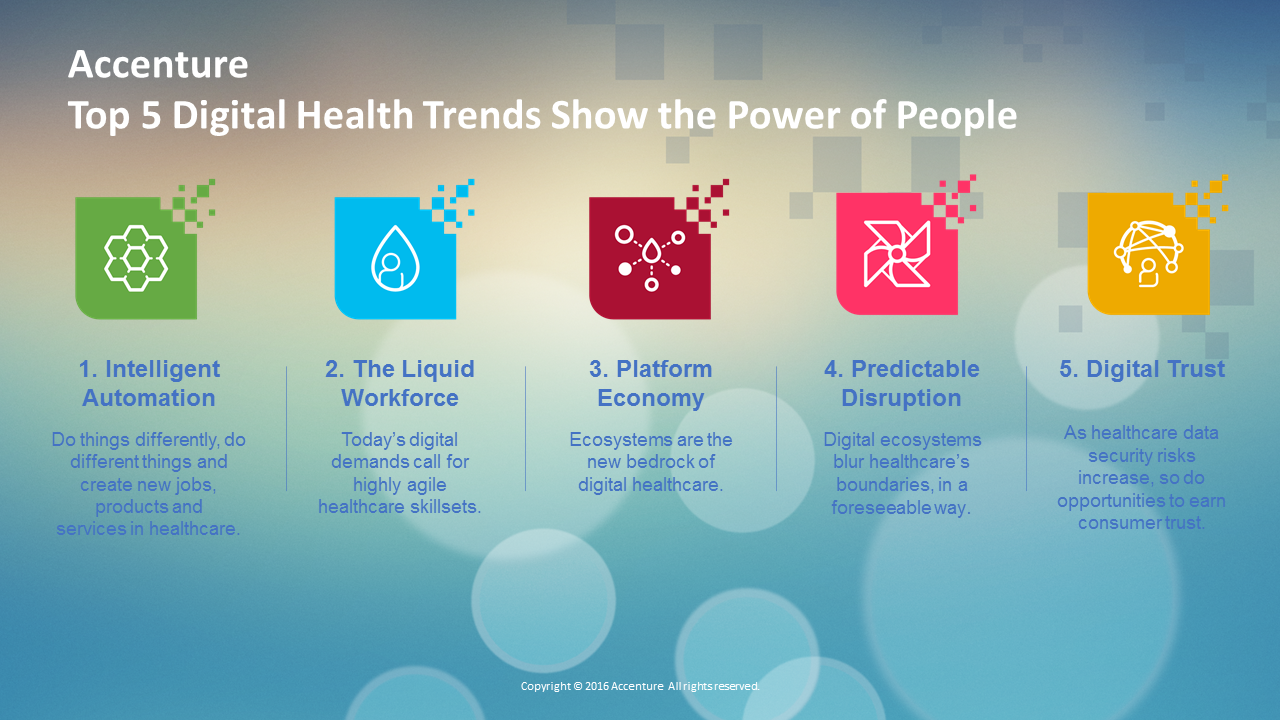
Digital platforms and tools are fast-advancing in all industries, and especially in health and health care. But it’s people-first, and digital PLUS analog, based on Accenture’s latest forecast of five macro technology trends. The five forces are: Intelligent automation – 70% of health executives expect to invest more in artificial intelligence; Liquid workforce – 42% of health/care workers are expected to be contractors or free agents within organizations within 3 years’ Platform economy – 10x growth is expected in application programming interfaces (APIs) in the next five years, which will enable data to liquidly move across healthcare platforms Predictable disruption





 Jane was named as a member of the AHIP 2024 Advisory Board, joining some valued colleagues to prepare for the challenges and opportunities facing health plans, systems, and other industry stakeholders.
Jane was named as a member of the AHIP 2024 Advisory Board, joining some valued colleagues to prepare for the challenges and opportunities facing health plans, systems, and other industry stakeholders.  Join Jane at AHIP's annual meeting in Las Vegas: I'll be speaking, moderating a panel, and providing thought leadership on health consumers and bolstering equity, empowerment, and self-care.
Join Jane at AHIP's annual meeting in Las Vegas: I'll be speaking, moderating a panel, and providing thought leadership on health consumers and bolstering equity, empowerment, and self-care. As a proud Big Ten alum, I'm thrilled to be invited to meet with the OSU HSMP Alumni Society to share perspectives on health care innovation.
As a proud Big Ten alum, I'm thrilled to be invited to meet with the OSU HSMP Alumni Society to share perspectives on health care innovation.